
firebase-ios-sdk
Firebase SDK for Apple App Development
Stars: 6369
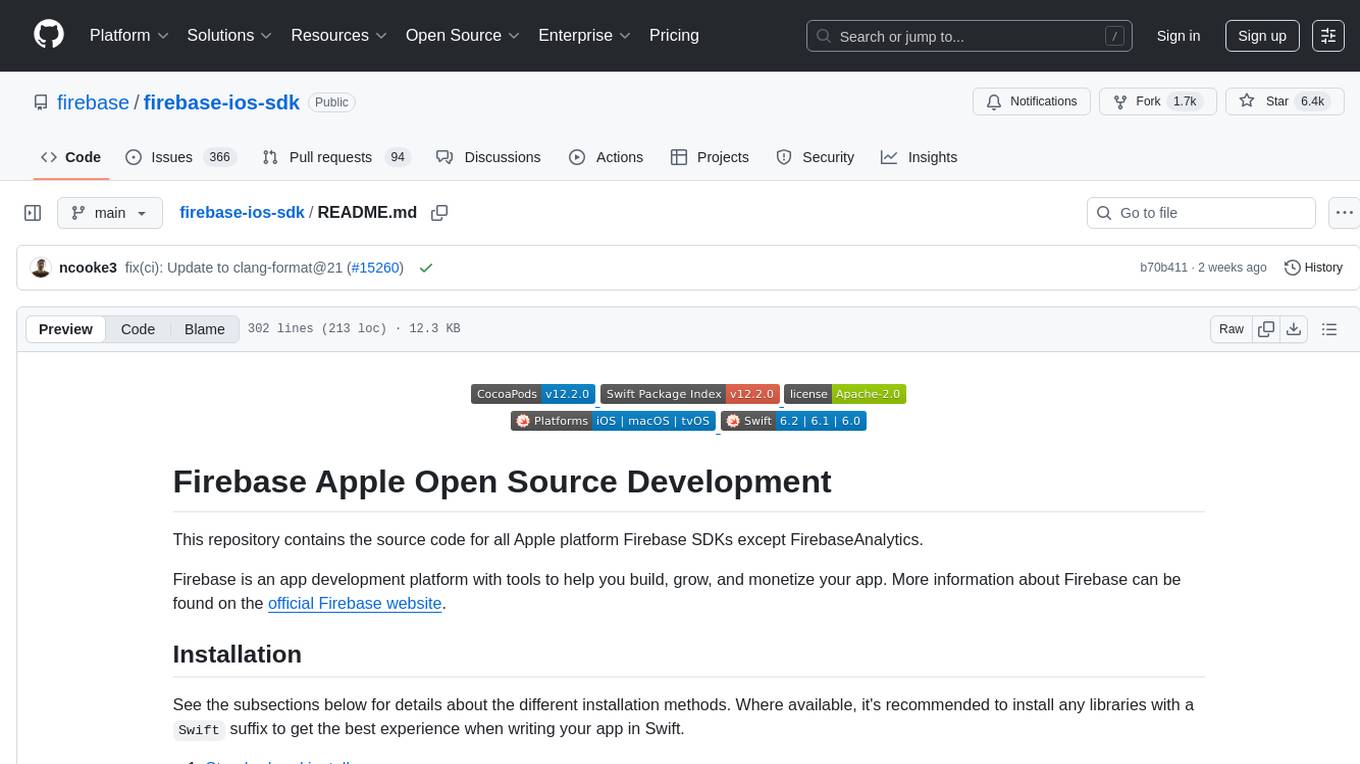
This repository contains the source code for all Apple platform Firebase SDKs except FirebaseAnalytics. Firebase is an app development platform with tools to help you build, grow, and monetize your app. It provides installation methods like Standard pod install, Swift Package Manager, Installing from the GitHub repo, and Experimental Carthage. Development requires Xcode 16.2 or later, and supports CocoaPods and Swift Package Manager. The repository includes instructions for adding a new Firebase Pod, managing headers and imports, code formatting, running unit tests, running sample apps, and generating coverage reports. Specific component instructions are provided for Firebase AI Logic, Firebase Auth, Firebase Database, Firebase Dynamic Links, Firebase Performance Monitoring, Firebase Storage, and Push Notifications. Firebase also offers beta support for macOS, Catalyst, and tvOS, with community support for visionOS and watchOS.
README:
This repository contains the source code for all Apple platform Firebase SDKs except FirebaseAnalytics.
Firebase is an app development platform with tools to help you build, grow, and monetize your app. More information about Firebase can be found on the official Firebase website.
See the subsections below for details about the different installation methods. Where
available, it's recommended to install any libraries with a Swift suffix to get the
best experience when writing your app in Swift.
For instructions on the standard pod install, visit: https://firebase.google.com/docs/ios/setup.
Instructions for Swift Package Manager support can be found in the SwiftPackageManager.md Markdown file.
These instructions can be used to access the Firebase repo at other branches, tags, or commits.
See the Podfile Syntax Reference for instructions and options about overriding pod source locations.
All official releases are tagged in this repo and available via CocoaPods. To access a local source snapshot or unreleased branch, use Podfile directives like the following:
To access FirebaseFirestore via a branch:
pod 'FirebaseCore', :git => 'https://github.com/firebase/firebase-ios-sdk.git', :branch => 'main'
pod 'FirebaseFirestore', :git => 'https://github.com/firebase/firebase-ios-sdk.git', :branch => 'main'To access FirebaseMessaging via a checked-out version of the firebase-ios-sdk repo:
pod 'FirebaseCore', :path => '/path/to/firebase-ios-sdk'
pod 'FirebaseMessaging', :path => '/path/to/firebase-ios-sdk'Instructions for the experimental Carthage distribution can be found at Carthage.md.
For details on using Firebase from a Framework or a library, refer to firebase_in_libraries.md.
To develop Firebase software in this repository, ensure that you have at least the following software:
- Xcode 16.2 (or later)
CocoaPods is still the canonical way to develop, but much of the repo now supports development with Swift Package Manager.
Install the following:
- CocoaPods 1.12.0 (or later)
- CocoaPods generate
For the pod that you want to develop:
pod gen Firebase{name here}.podspec --local-sources=./ --auto-open --platforms=iosNote: If the CocoaPods cache is out of date, you may need to run
pod repo update before the pod gen command.
Note: Set the --platforms option to macos or tvos to develop/test for
those platforms. Since 10.2, Xcode does not properly handle multi-platform
CocoaPods workspaces.
Firestore has a self-contained Xcode project. See Firestore/README Markdown file.
pod gen {name here}.podspec --local-sources=./ --auto-open --platforms=ios- Check the Mac box in the App-iOS Build Settings
- Sign the App in the Settings Signing & Capabilities tab
- Click Pods in the Project Manager
- Add Signing to the iOS host app and unit test targets
- Select the Unit-unit scheme
- Run it to build and test
Alternatively, disable signing in each target:
- Go to Build Settings tab
- Click
+ - Select
Add User-Defined Setting - Add
CODE_SIGNING_REQUIREDsetting with a value ofNO
- To enable test schemes:
./scripts/setup_spm_tests.sh -
open Package.swiftor double clickPackage.swiftin Finder. - Xcode will open the project
- Choose a scheme for a library to build or test suite to run
- Choose a target platform by selecting the run destination along with the scheme
Refer to AddNewPod Markdown file for details.
For information about managing headers and imports, see HeadersImports Markdown file.
To ensure that the code is formatted consistently, run the script ./scripts/check.sh before creating a pull request (PR).
GitHub Actions will verify that any code changes are done in a style-compliant
way. Install clang-format and mint:
brew install clang-format@21
brew install mintSelect a scheme and press Command-u to build a component and run its unit tests.
To run the sample apps and integration tests, you'll need a valid
GoogleService-Info.plist file. The Firebase Xcode project contains dummy plist
files without real values, but they can be replaced with real plist files. To get your own
GoogleService-Info.plist files:
- Go to the Firebase Console
- Create a new Firebase project, if you don't already have one
- For each sample app you want to test, create a new Firebase app with the sample app's bundle
identifier (e.g.,
com.google.Database-Example) - Download the resulting
GoogleService-Info.plistand add it to the Xcode project.
For coverage report generation instructions, see scripts/code_coverage_report/README Markdown file.
See the sections below for any special instructions for those components.
See the Firebase AI Logic README for instructions about building and testing the SDK.
For specific Firebase Auth development, refer to the Auth Sample README for instructions about building and running the FirebaseAuth pod along with various samples and tests.
The Firebase Database Integration tests can be run against a locally running Database Emulator or against a production instance.
To run against a local emulator instance, invoke ./scripts/run_database_emulator.sh start before
running the integration test.
To run against a production instance, provide a valid GoogleServices-Info.plist and copy it to
FirebaseDatabase/Tests/Resources/GoogleService-Info.plist. Your Security Rule must be set to
public while your tests are
running.
Firebase Dynamic Links is deprecated and should not be used in new projects. The service will shut down on August 25, 2025.
Please see our Dynamic Links Deprecation FAQ documentation for more guidance.
For specific Firebase Performance Monitoring development, see the Performance README for instructions about building the SDK and the Performance TestApp README for instructions about integrating Performance with the dev test App.
To run the Storage Integration tests, follow the instructions in StorageIntegration.swift.
Push notifications can only be delivered to specially provisioned App IDs in the developer portal. In order to test receiving push notifications, you will need to:
- Change the bundle identifier of the sample app to something you own in your Apple Developer account and enable that App ID for push notifications.
- You'll also need to upload your APNs Provider Authentication Key or certificate to the Firebase Console at Project Settings > Cloud Messaging > [Your Firebase App].
- Ensure your iOS device is added to your Apple Developer portal as a test device.
The iOS Simulator cannot register for remote notifications and will not receive push notifications. To receive push notifications, follow the steps above and run the app on a physical device.
Firebase provides official beta support for macOS, Catalyst, and tvOS. visionOS and watchOS are community supported. Thanks to community contributions for many of the multi-platform PRs.
At this time, most of Firebase's products are available across Apple platforms. There are still a few gaps, especially on visionOS and watchOS. For details about the current support matrix, see this chart in Firebase's documentation.
Where supported, visionOS works as expected with the exception of Firestore via Swift Package Manager where it is required to use the source distribution.
To enable the Firestore source distribution, quit Xcode and open the desired
project from the command line with the FIREBASE_SOURCE_FIRESTORE environment
variable: open --env FIREBASE_SOURCE_FIRESTORE /path/to/project.xcodeproj.
To go back to using the binary distribution of Firestore, quit Xcode and open
Xcode like normal, without the environment variable.
Thanks to contributions from the community, many of Firebase SDKs now compile, run unit tests, and work on watchOS. See the Independent Watch App Sample.
Keep in mind that watchOS is not officially supported by Firebase. While we can catch basic unit test issues with GitHub Actions, there may be some changes where the SDK no longer works as expected on watchOS. If you encounter this, please file an issue.
During app setup in the console, you may get to a step that mentions something like "Checking if the app has communicated with our servers". This relies on Analytics and will not work on watchOS. It's safe to ignore the message and continue, the rest of the SDKs will work as expected.
- watchOS has limited support. Due to watchOS restrictions, mach exceptions and signal crashes are not recorded. (Crashes in SwiftUI are generated as mach exceptions, so will not be recorded)
Thanks to contributions from the community, FirebaseCombineSwift contains support for Apple's Combine framework. This module is currently under development and not yet supported for use in production environments. For more details, please refer to the docs.
See Roadmap for more about the Firebase Apple SDK Open Source plans and directions.
See Contributing for more information on contributing to the Firebase Apple SDK.
The contents of this repository are licensed under the Apache License, version 2.0.
Your use of Firebase is governed by the Terms of Service for Firebase Services.
For Tasks:
Click tags to check more tools for each tasksFor Jobs:
Alternative AI tools for firebase-ios-sdk
Similar Open Source Tools

firebase-ios-sdk
This repository contains the source code for all Apple platform Firebase SDKs except FirebaseAnalytics. Firebase is an app development platform with tools to help you build, grow, and monetize your app. It provides installation methods like Standard pod install, Swift Package Manager, Installing from the GitHub repo, and Experimental Carthage. Development requires Xcode 16.2 or later, and supports CocoaPods and Swift Package Manager. The repository includes instructions for adding a new Firebase Pod, managing headers and imports, code formatting, running unit tests, running sample apps, and generating coverage reports. Specific component instructions are provided for Firebase AI Logic, Firebase Auth, Firebase Database, Firebase Dynamic Links, Firebase Performance Monitoring, Firebase Storage, and Push Notifications. Firebase also offers beta support for macOS, Catalyst, and tvOS, with community support for visionOS and watchOS.
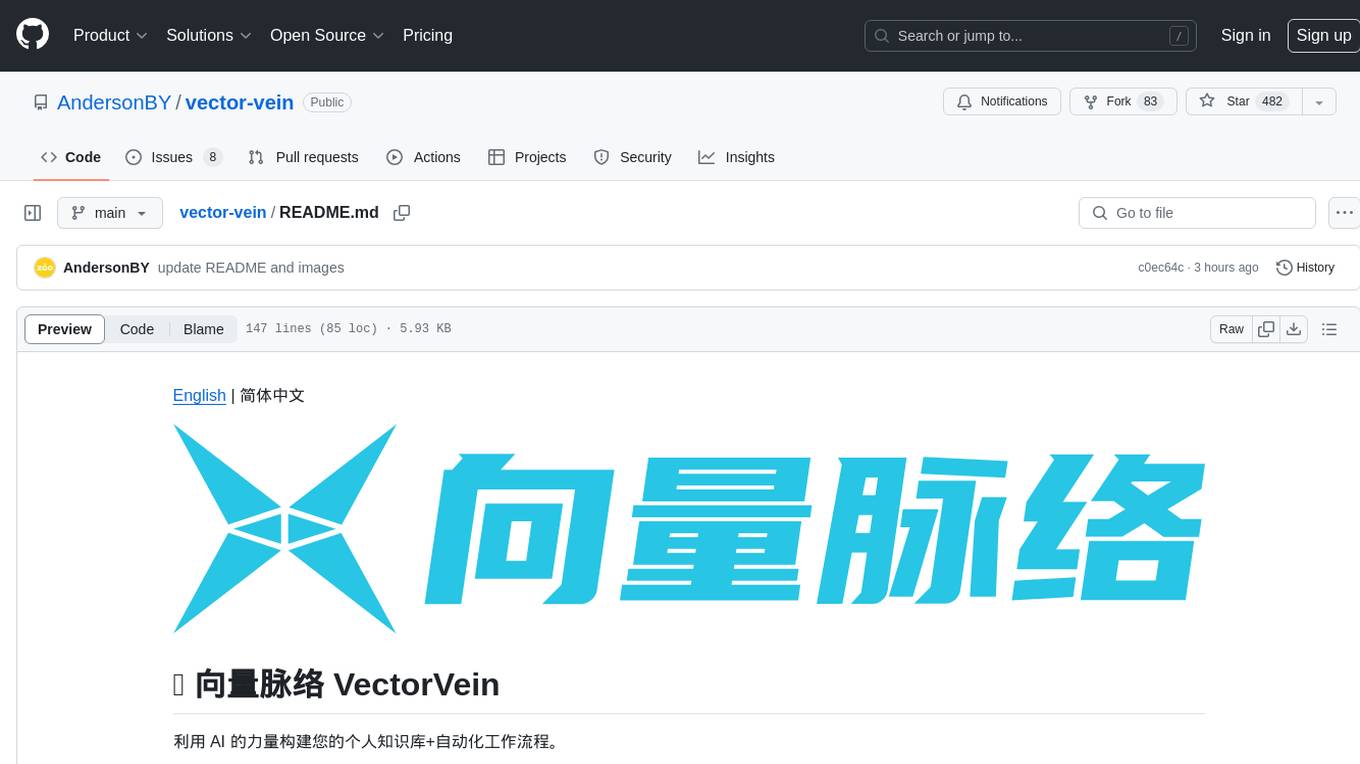
vector-vein
VectorVein is a no-code AI workflow software inspired by LangChain and langflow, aiming to combine the powerful capabilities of large language models and enable users to achieve intelligent and automated daily workflows through simple drag-and-drop actions. Users can create powerful workflows without the need for programming, automating all tasks with ease. The software allows users to define inputs, outputs, and processing methods to create customized workflow processes for various tasks such as translation, mind mapping, summarizing web articles, and automatic categorization of customer reviews.
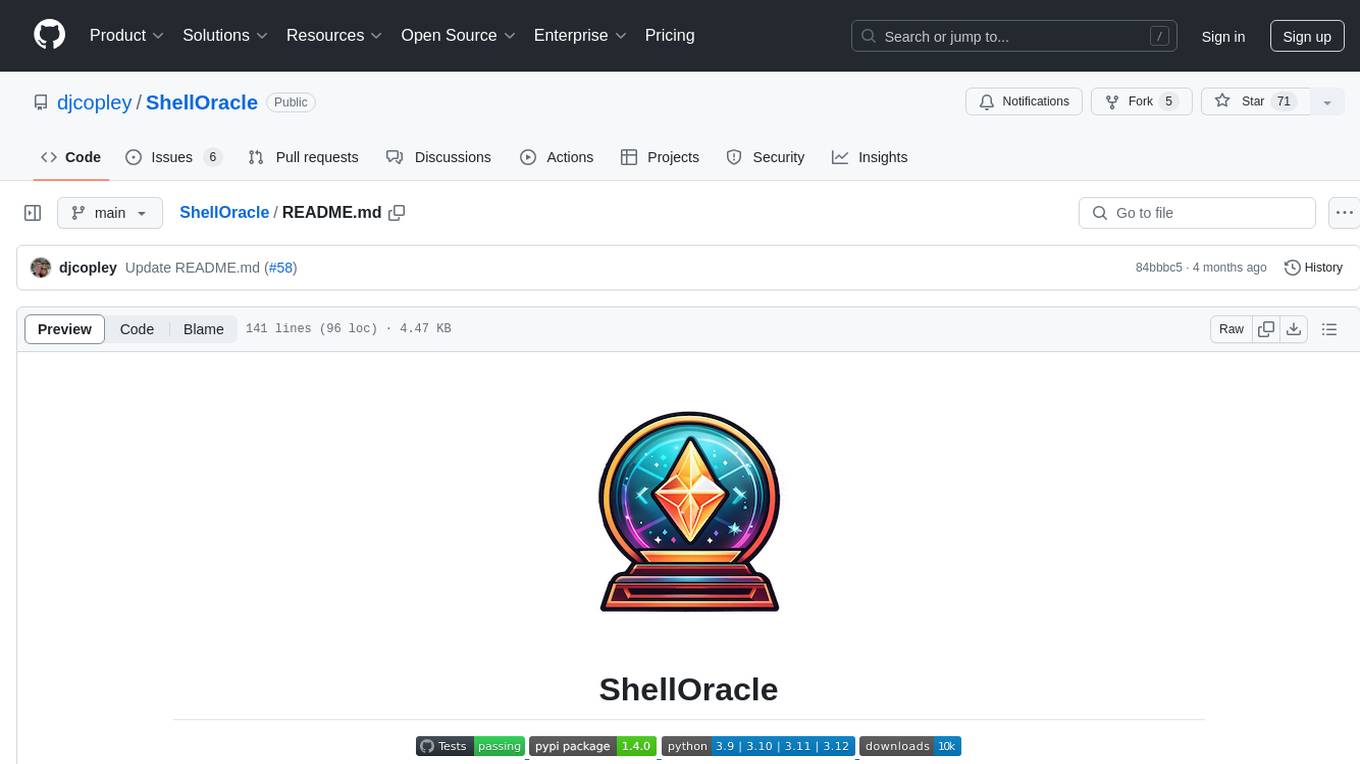
ShellOracle
ShellOracle is an innovative terminal utility designed for intelligent shell command generation, bringing a new level of efficiency to your command-line interactions. It supports seamless shell command generation from written descriptions, command history for easy reference, Unix pipe support for advanced command chaining, self-hosted for full control over your environment, and highly configurable to adapt to your preferences. It can be easily installed using pipx, upgraded with simple commands, and used as a BASH/ZSH widget activated by the CTRL+F keyboard shortcut. ShellOracle can also be run as a Python module or using its entrypoint 'shor'. The tool supports providers like Ollama, OpenAI, and LocalAI, with detailed instructions for each provider. Configuration options are available to customize the utility according to user preferences and requirements. ShellOracle is compatible with BASH and ZSH on macOS and Linux, with no specific hardware requirements for cloud providers like OpenAI.
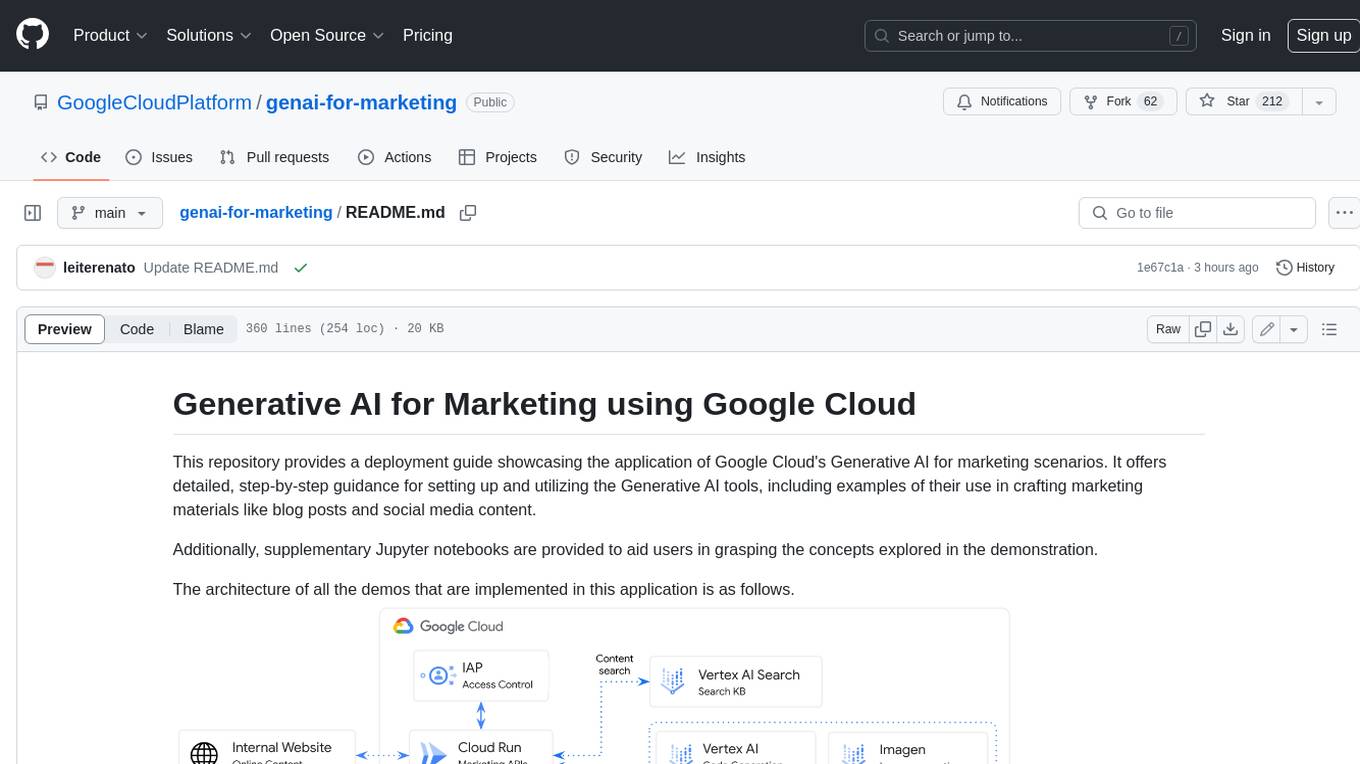
genai-for-marketing
This repository provides a deployment guide for utilizing Google Cloud's Generative AI tools in marketing scenarios. It includes step-by-step instructions, examples of crafting marketing materials, and supplementary Jupyter notebooks. The demos cover marketing insights, audience analysis, trendspotting, content search, content generation, and workspace integration. Users can access and visualize marketing data, analyze trends, improve search experience, and generate compelling content. The repository structure includes backend APIs, frontend code, sample notebooks, templates, and installation scripts.
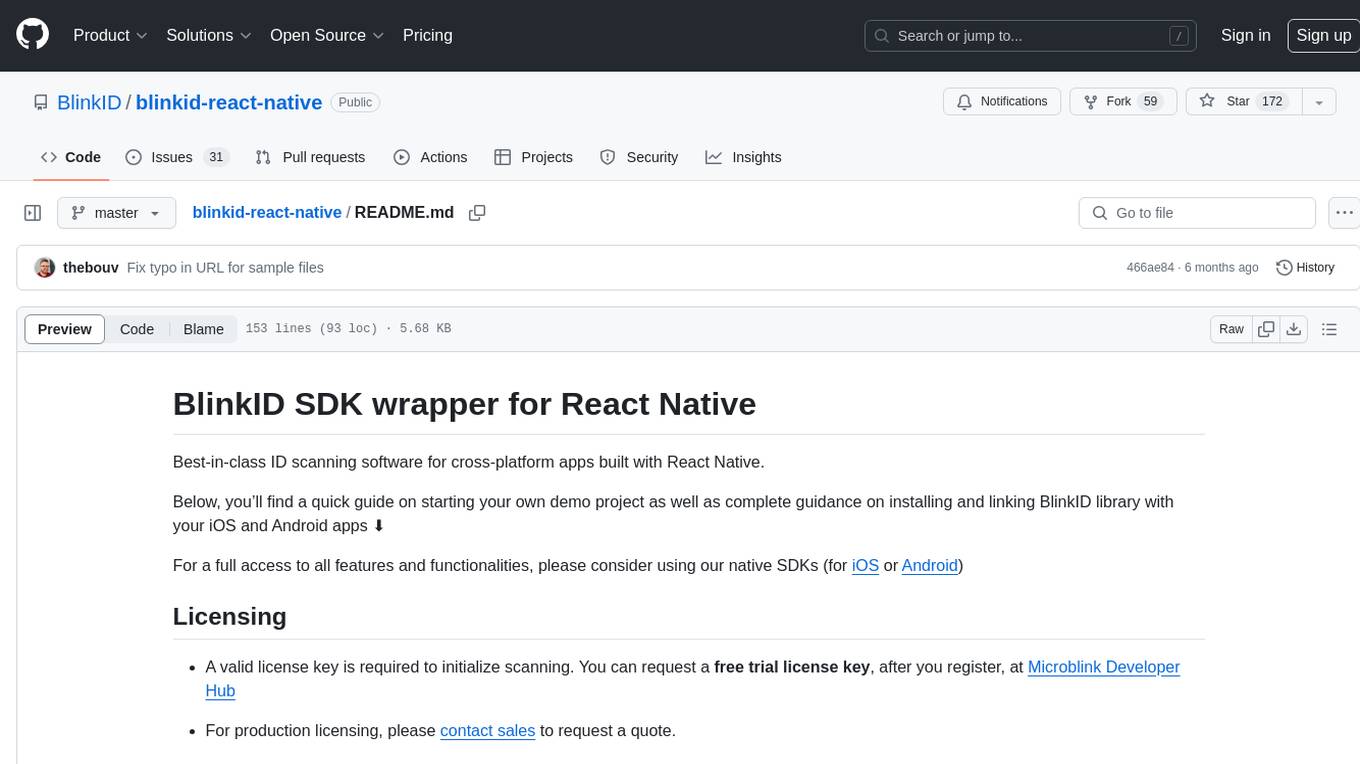
blinkid-react-native
BlinkID SDK wrapper for React Native provides best-in-class ID scanning software for cross-platform apps built with React Native. It offers complete guidance on installing and linking BlinkID library with iOS and Android apps. The SDK requires a valid license key for scanning, with offline data extraction. It supports React Native v0.71.2 and includes installation and linking instructions for iOS and Android. The repository also contains a script to create a sample React Native project and dependencies. Video tutorials demonstrate using documentVerificationOverlay and CombinedRecognizer for scanning various document types.
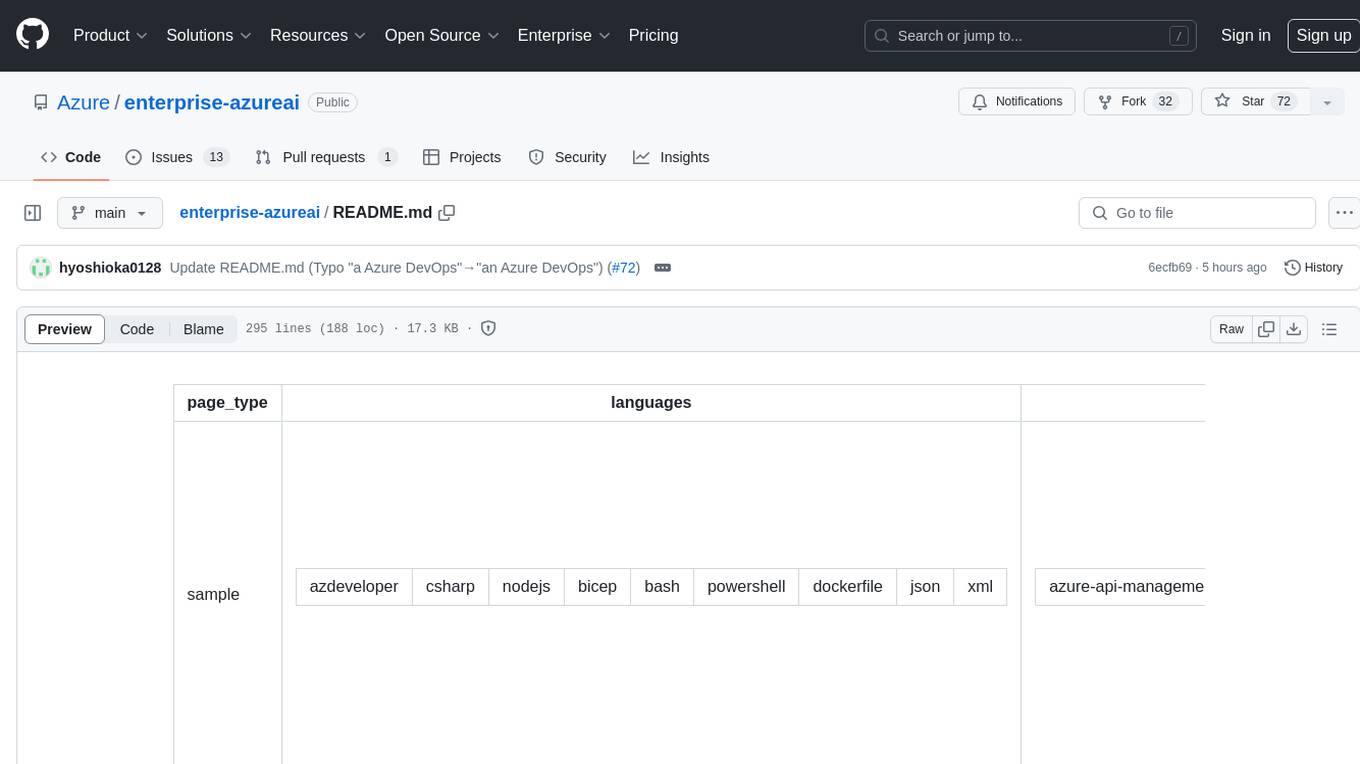
enterprise-azureai
Azure OpenAI Service is a central capability with Azure API Management, providing guidance and tools for organizations to implement Azure OpenAI in a production environment with an emphasis on cost control, secure access, and usage monitoring. It includes infrastructure-as-code templates, CI/CD pipelines, secure access management, usage monitoring, load balancing, streaming requests, and end-to-end samples like ChatApp and Azure Dashboards.
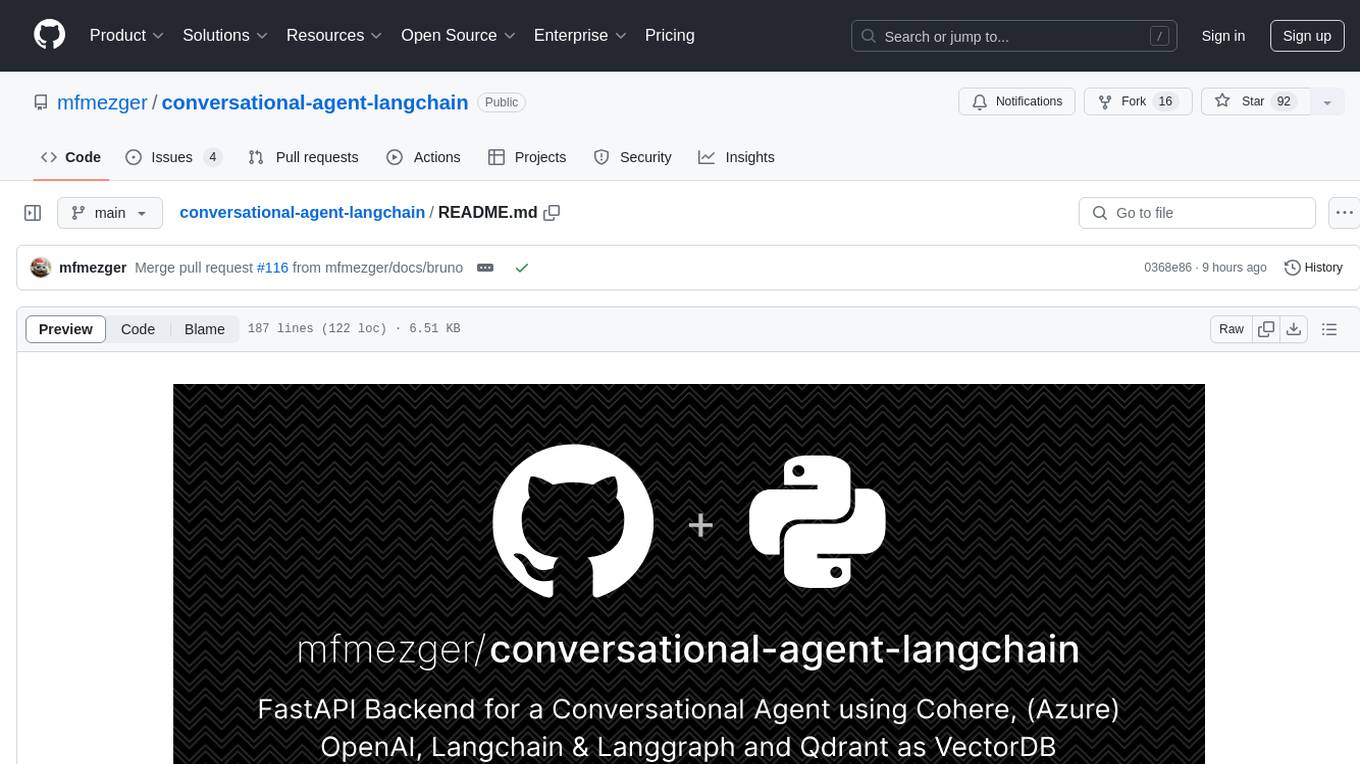
conversational-agent-langchain
This repository contains a Rest-Backend for a Conversational Agent that allows embedding documents, semantic search, QA based on documents, and document processing with Large Language Models. It uses Aleph Alpha and OpenAI Large Language Models to generate responses to user queries, includes a vector database, and provides a REST API built with FastAPI. The project also features semantic search, secret management for API keys, installation instructions, and development guidelines for both backend and frontend components.
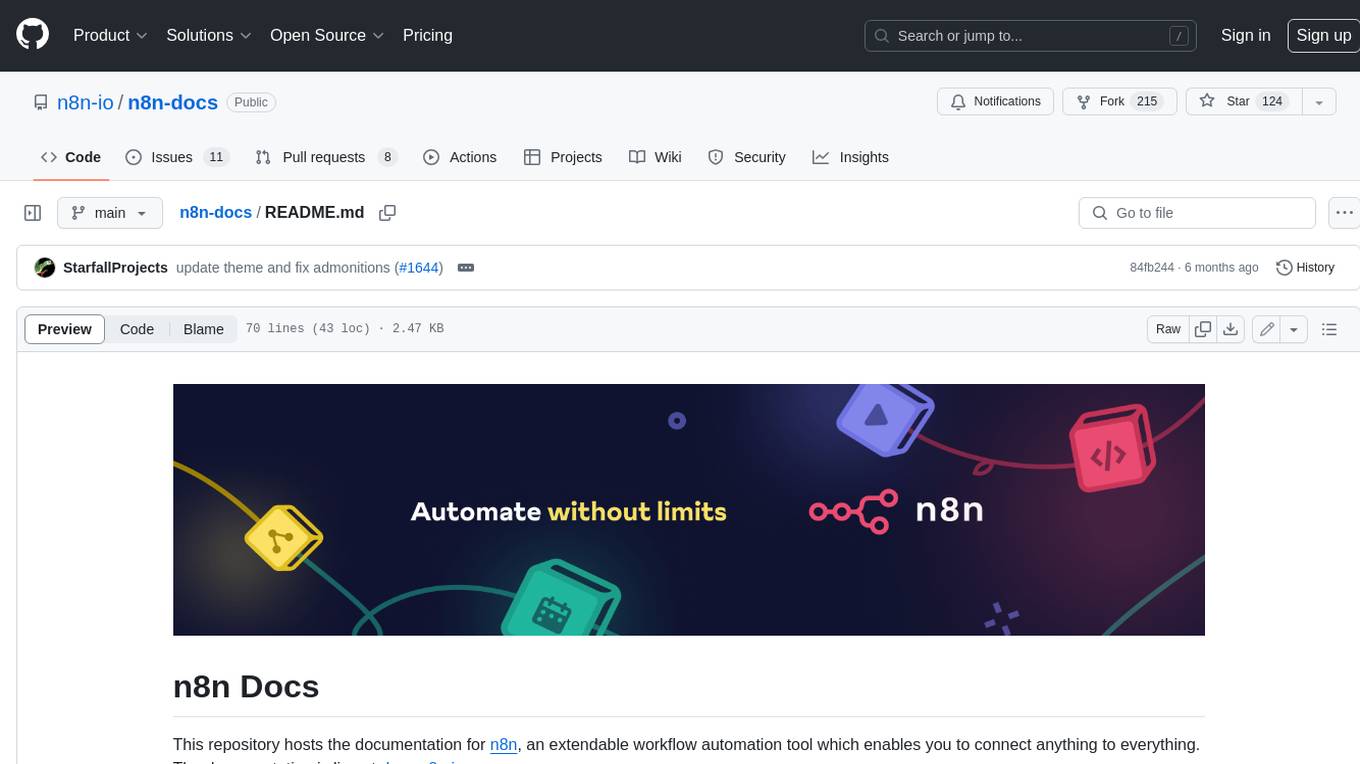
n8n-docs
n8n is an extendable workflow automation tool that enables you to connect anything to everything. It is open-source and can be self-hosted or used as a service. n8n provides a visual interface for creating workflows, which can be used to automate tasks such as data integration, data transformation, and data analysis. n8n also includes a library of pre-built nodes that can be used to connect to a variety of applications and services. This makes it easy to create complex workflows without having to write any code.
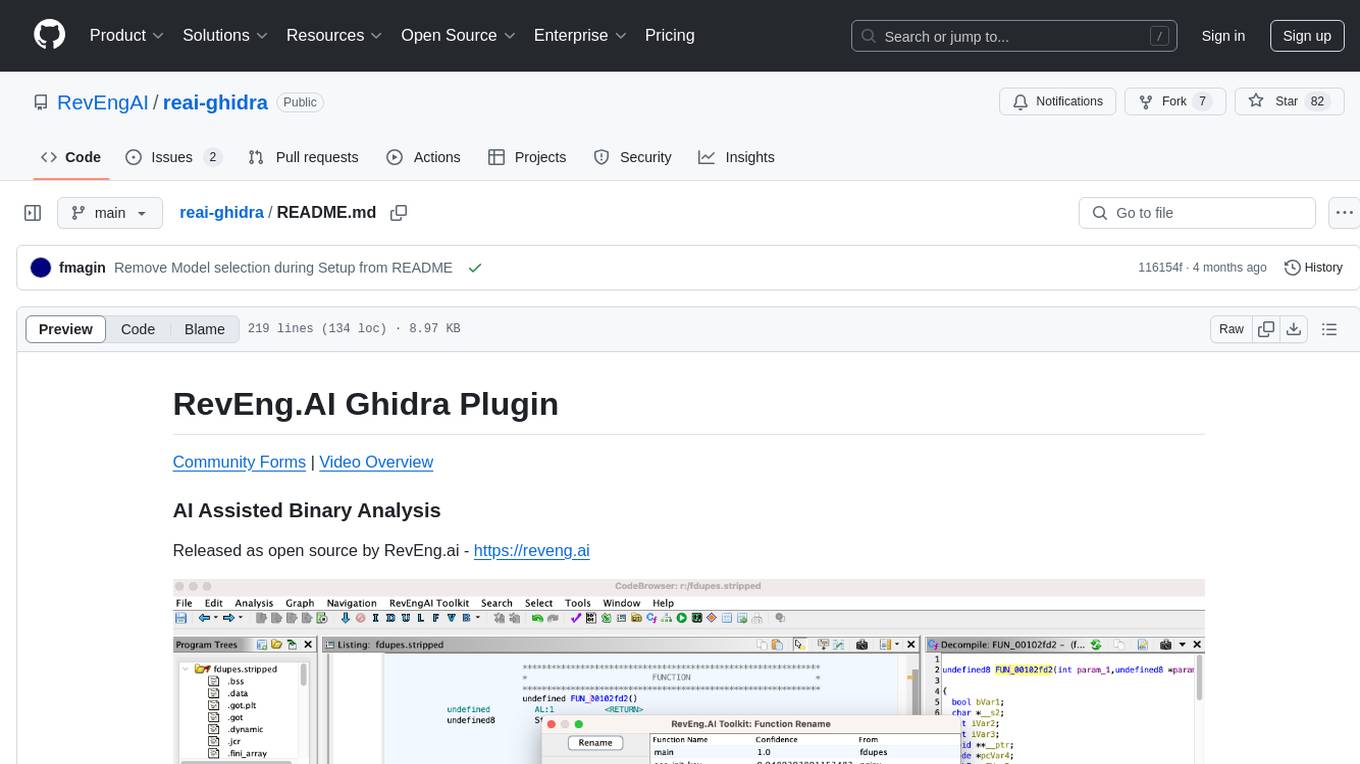
reai-ghidra
The RevEng.AI Ghidra Plugin by RevEng.ai allows users to interact with their API within Ghidra for Binary Code Similarity analysis to aid in Reverse Engineering stripped binaries. Users can upload binaries, rename functions above a confidence threshold, and view similar functions for a selected function.
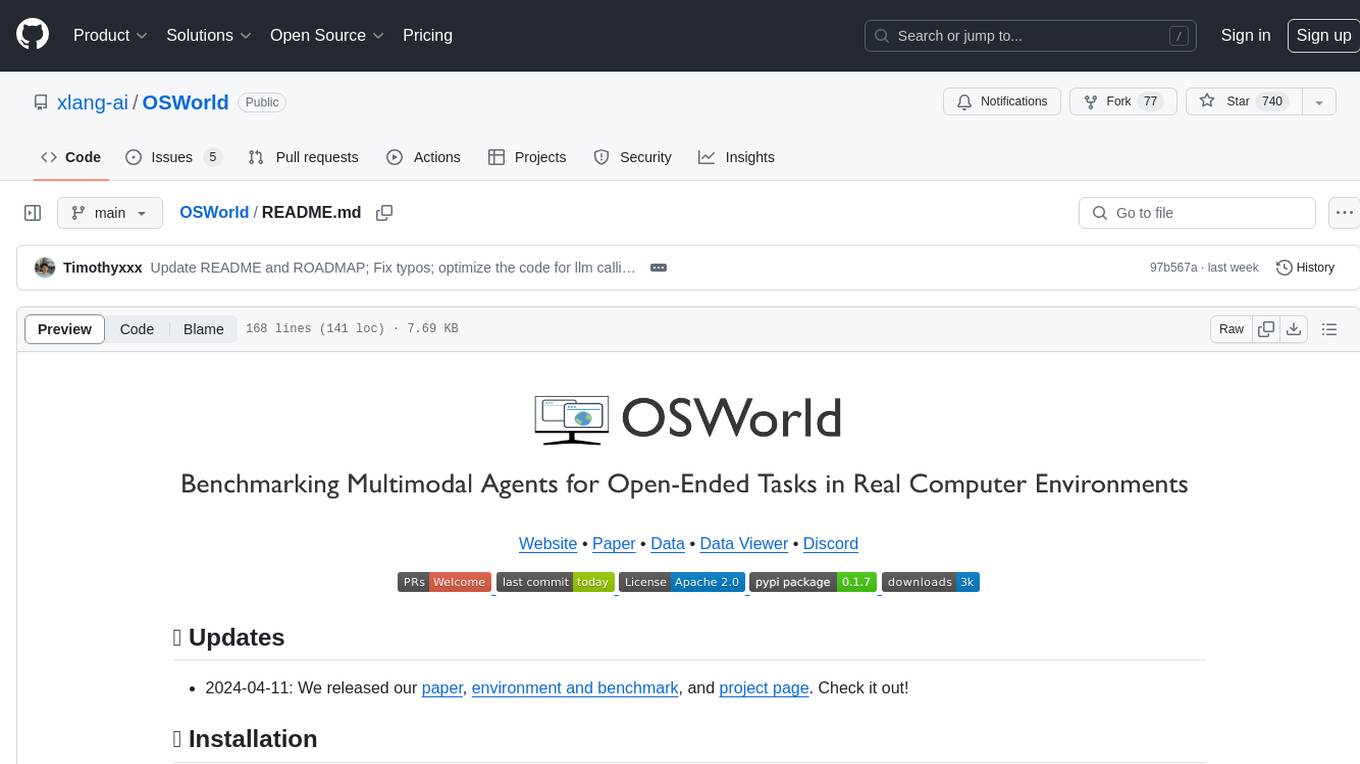
OSWorld
OSWorld is a benchmarking tool designed to evaluate multimodal agents for open-ended tasks in real computer environments. It provides a platform for running experiments, setting up virtual machines, and interacting with the environment using Python scripts. Users can install the tool on their desktop or server, manage dependencies with Conda, and run benchmark tasks. The tool supports actions like executing commands, checking for specific results, and evaluating agent performance. OSWorld aims to facilitate research in AI by providing a standardized environment for testing and comparing different agent baselines.
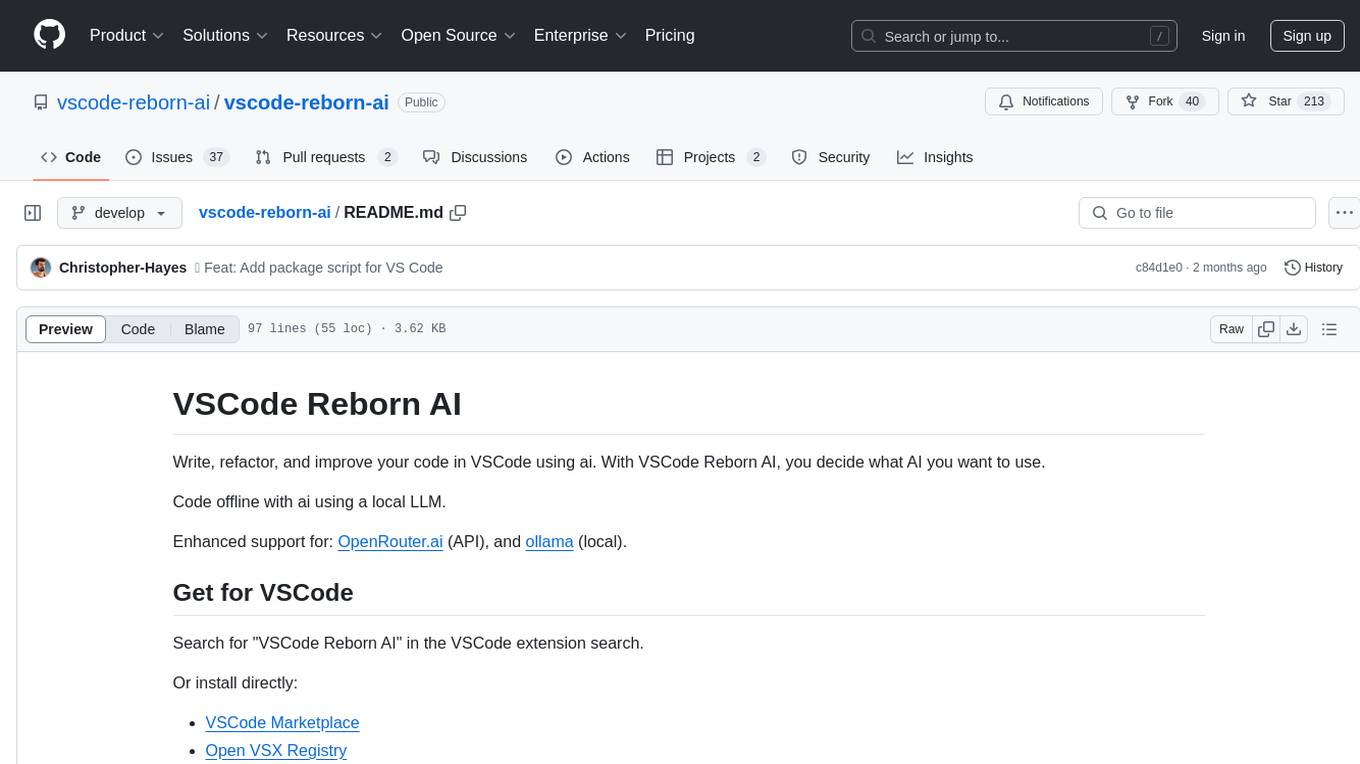
vscode-reborn-ai
VSCode Reborn AI is a tool that allows users to write, refactor, and improve code in Visual Studio Code using artificial intelligence. Users can work offline with AI using a local LLM. The tool provides enhanced support for OpenRouter.ai API and ollama. It also offers compatibility with various local LLMs and alternative APIs. Additionally, it includes features such as internationalization, development setup instructions, testing in VS Code, packaging for VS Code, tech stack details, and licensing information.

azure-search-openai-javascript
This sample demonstrates a few approaches for creating ChatGPT-like experiences over your own data using the Retrieval Augmented Generation pattern. It uses Azure OpenAI Service to access the ChatGPT model (gpt-35-turbo), and Azure AI Search for data indexing and retrieval.
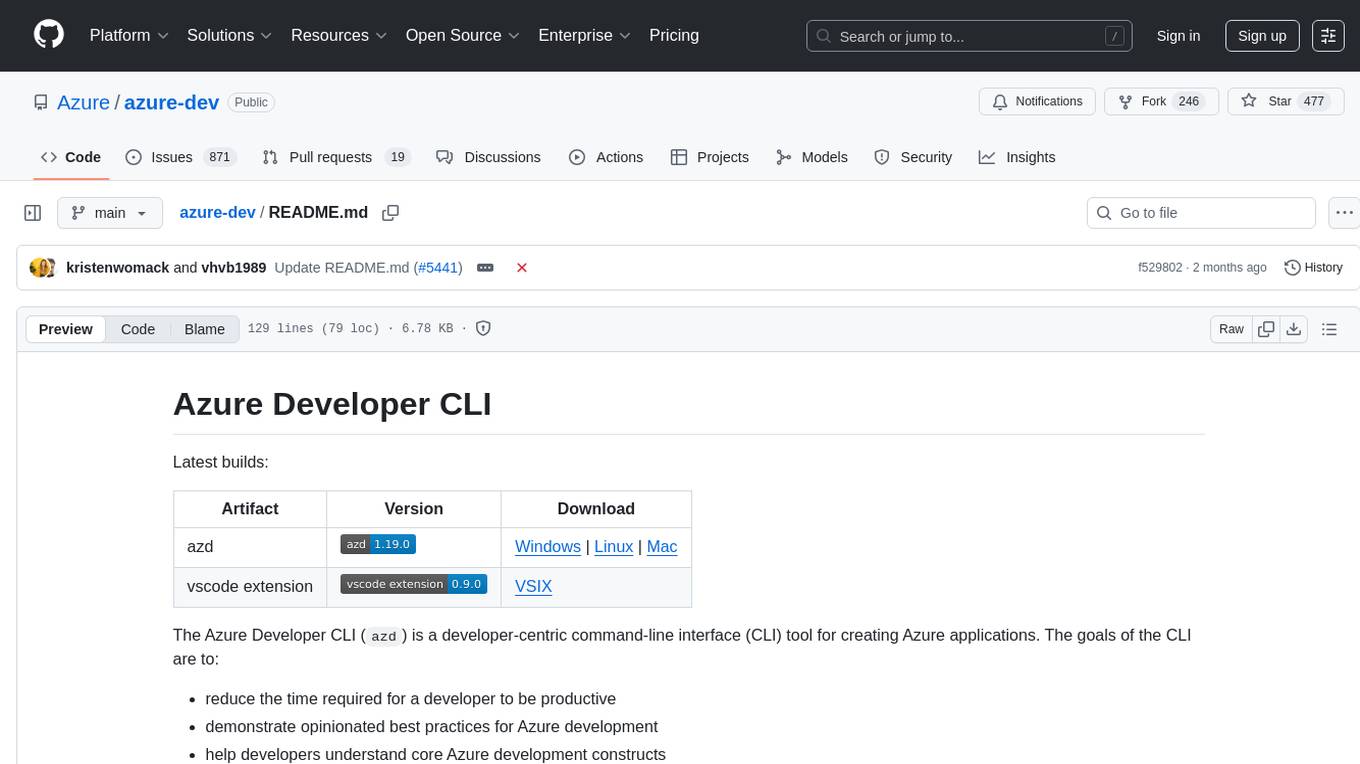
azure-dev
The Azure Developer CLI (`azd`) is a developer-centric command-line interface (CLI) tool for creating Azure applications. It aims to reduce the time required for a developer to be productive, demonstrate best practices for Azure development, and help developers understand core Azure development constructs. The CLI requires code repositories to adhere to specific conventions. It supports shell completion for `bash`, `zsh`, `fish`, and `powershell`. The software may collect information about users and their use of the software for service improvement. Telemetry collection is on by default but can be opted out by setting the environment variable `AZURE_DEV_COLLECT_TELEMETRY` to `no`. Contributions are welcome, and contributors need to agree to a Contributor License Agreement (CLA). The project has adopted the Microsoft Open Source Code of Conduct. The tool is licensed under Azure Developer CLI Templates Trust Notice.
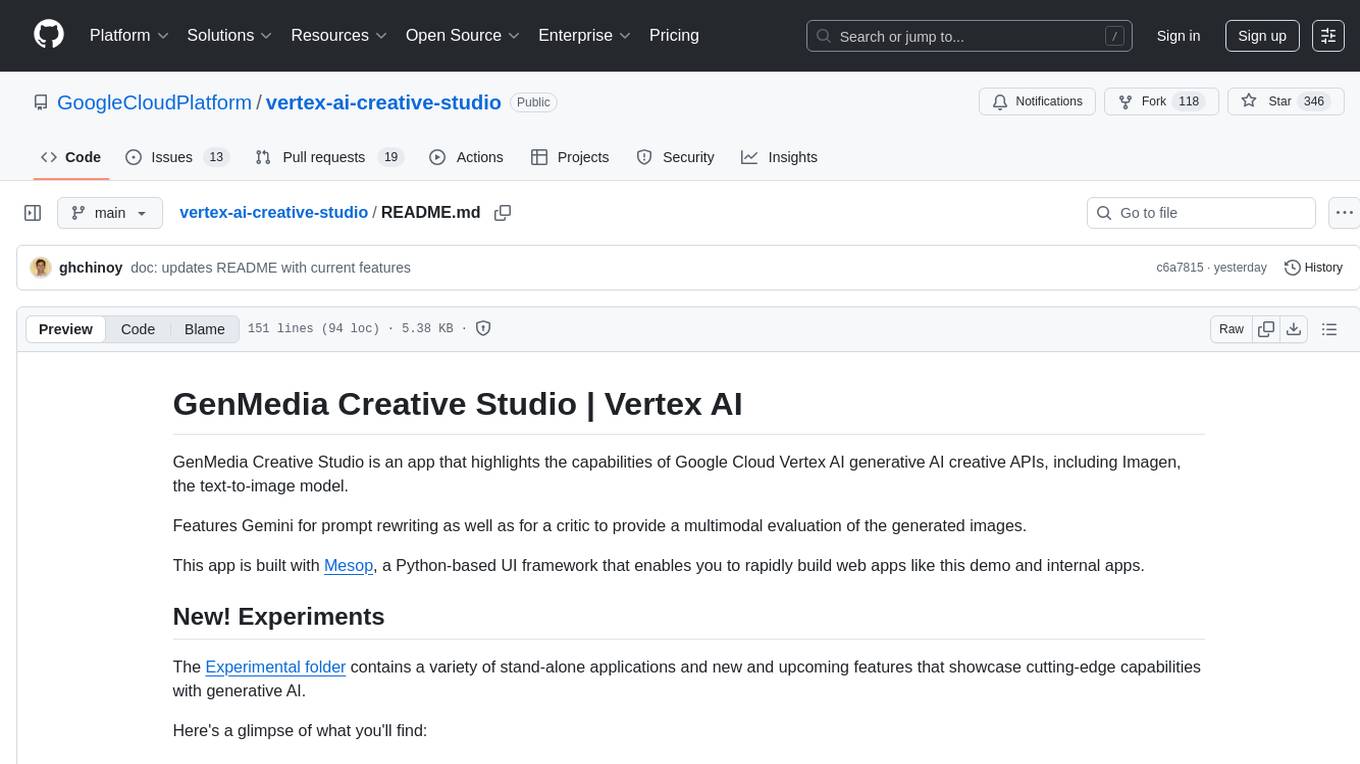
vertex-ai-creative-studio
GenMedia Creative Studio is an application showcasing the capabilities of Google Cloud Vertex AI generative AI creative APIs. It includes features like Gemini for prompt rewriting and multimodal evaluation of generated images. The app is built with Mesop, a Python-based UI framework, enabling rapid development of web and internal apps. The Experimental folder contains stand-alone applications and upcoming features demonstrating cutting-edge generative AI capabilities, such as image generation, prompting techniques, and audio/video tools.
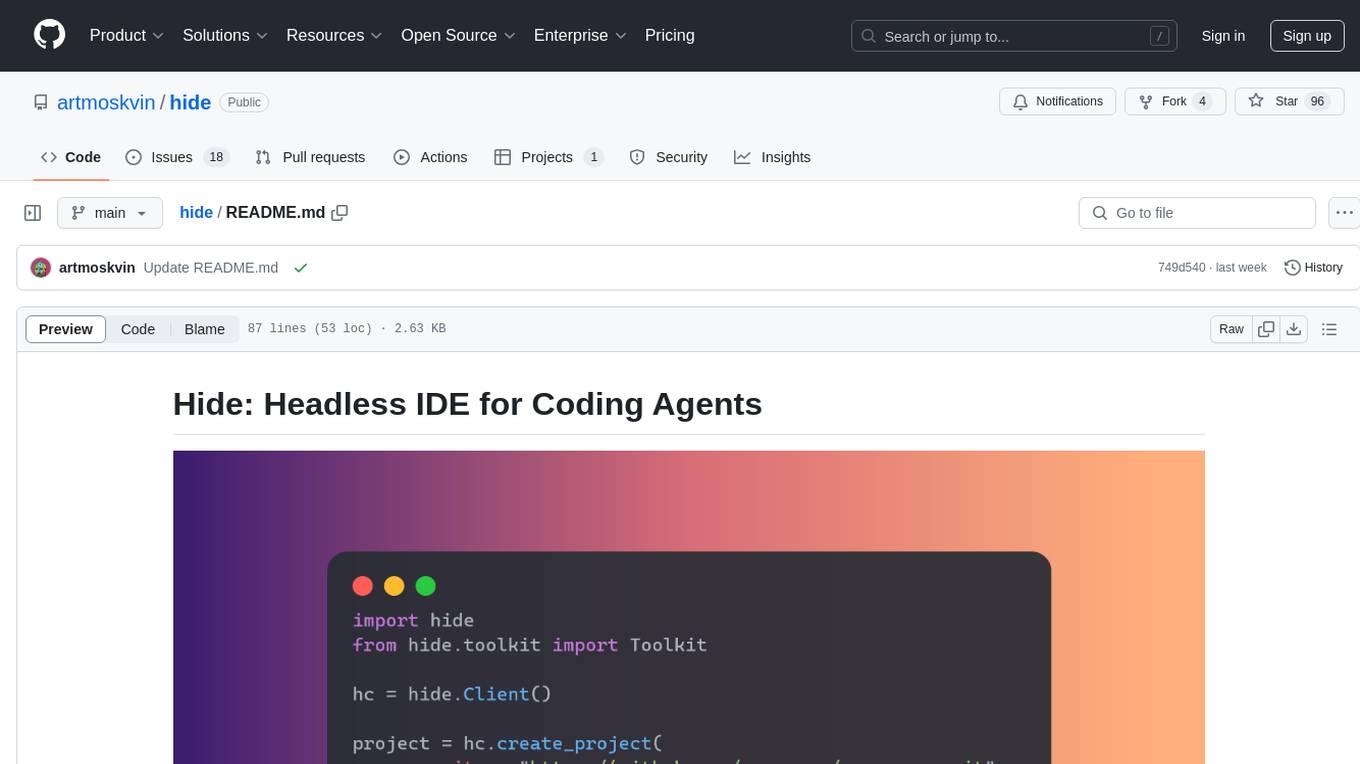
hide
Hide is a headless IDE that provides containerized development environments for codebases and exposes APIs for agents to interact with them. It spins up devcontainers, installs dependencies, and offers APIs for codebase interaction. Hide can be used to create custom toolkits or utilize pre-built toolkits for popular frameworks like Langchain. The Hide Runtime manages development containers and tasks, while the SDK provides APIs for coding agents to interact with the codebase.
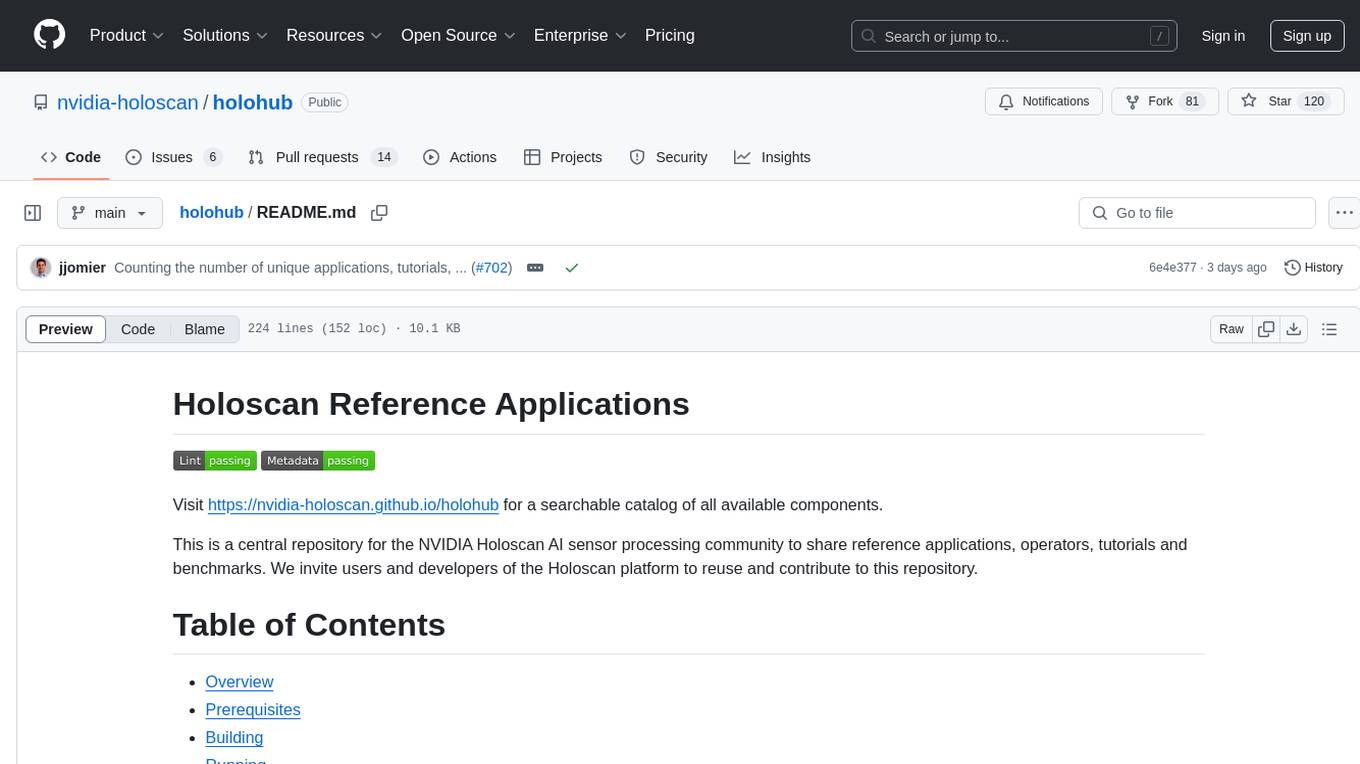
holohub
Holohub is a central repository for the NVIDIA Holoscan AI sensor processing community to share reference applications, operators, tutorials, and benchmarks. It includes example applications, community components, package configurations, and tutorials. Users and developers of the Holoscan platform are invited to reuse and contribute to this repository. The repository provides detailed instructions on prerequisites, building, running applications, contributing, and glossary terms. It also offers a searchable catalog of available components on the Holoscan SDK User Guide website.
For similar tasks
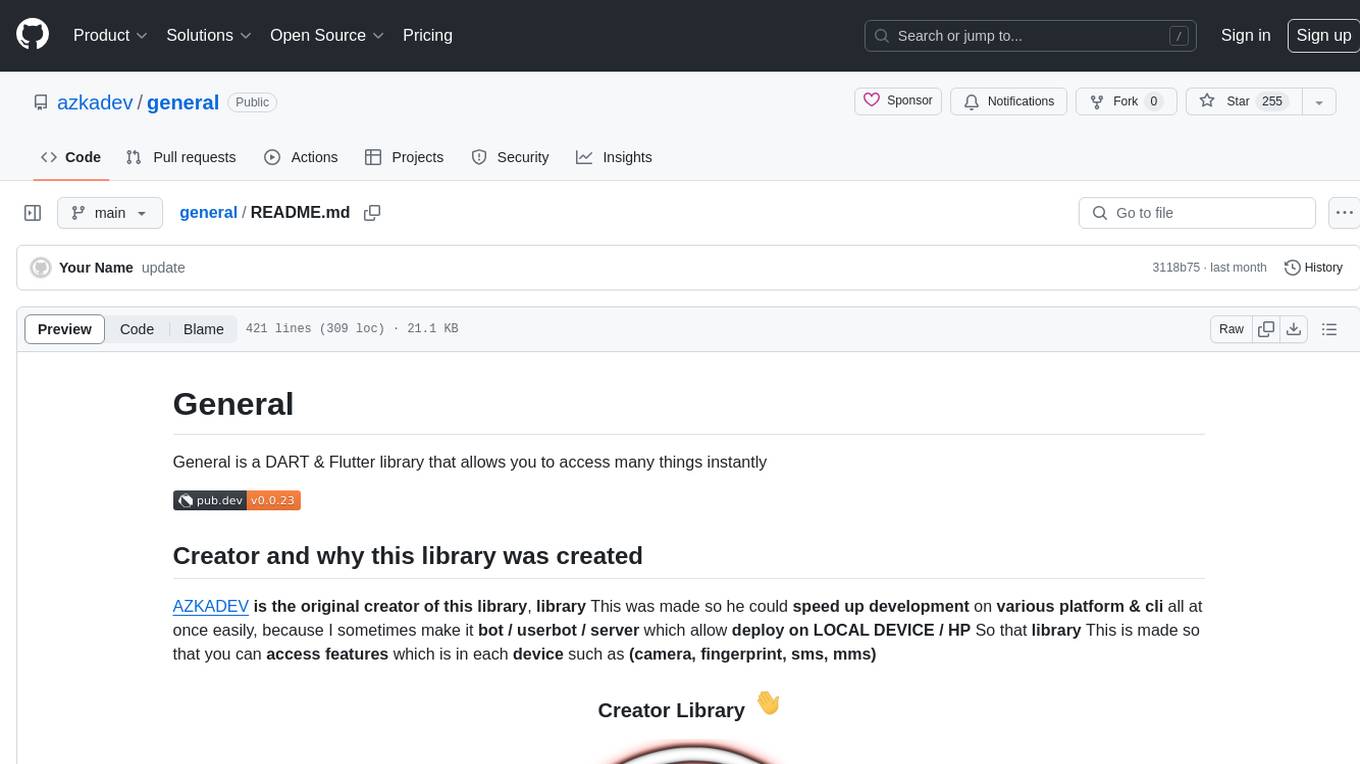
general
General is a DART & Flutter library created by AZKADEV to speed up development on various platforms and CLI easily. It allows access to features such as camera, fingerprint, SMS, and MMS. The library is designed for Dart language and provides functionalities for app background, text to speech, speech to text, and more.
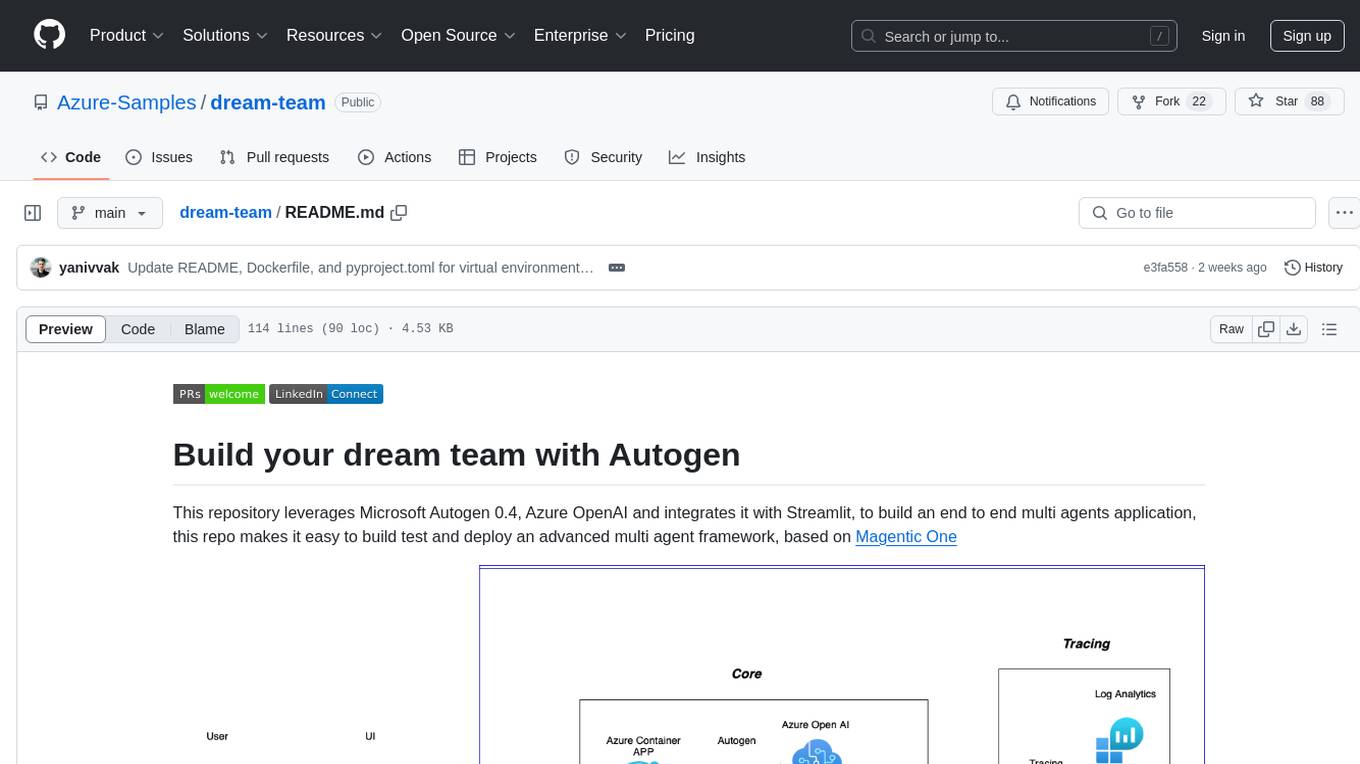
dream-team
Build your dream team with Autogen is a repository that leverages Microsoft Autogen 0.4, Azure OpenAI, and Streamlit to create an end-to-end multi-agent application. It provides an advanced multi-agent framework based on Magentic One, with features such as a friendly UI, single-line deployment, secure code execution, managed identities, and observability & debugging tools. Users can deploy Azure resources and the app with simple commands, work locally with virtual environments, install dependencies, update configurations, and run the application. The repository also offers resources for learning more about building applications with Autogen.
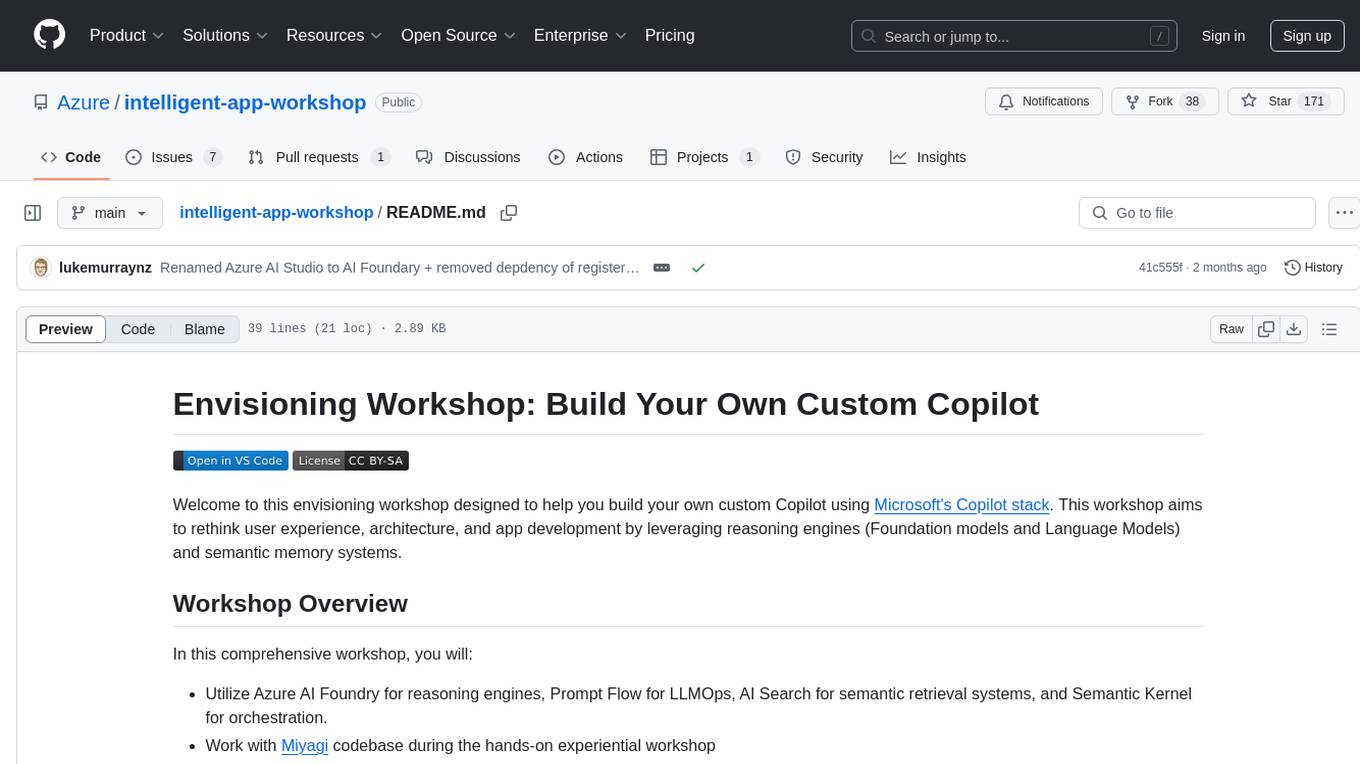
intelligent-app-workshop
Welcome to the envisioning workshop designed to help you build your own custom Copilot using Microsoft's Copilot stack. This workshop aims to rethink user experience, architecture, and app development by leveraging reasoning engines and semantic memory systems. You will utilize Azure AI Foundry, Prompt Flow, AI Search, and Semantic Kernel. Work with Miyagi codebase, explore advanced capabilities like AutoGen and GraphRag. This workshop guides you through the entire lifecycle of app development, including identifying user needs, developing a production-grade app, and deploying on Azure with advanced capabilities. By the end, you will have a deeper understanding of leveraging Microsoft's tools to create intelligent applications.

firebase-ios-sdk
This repository contains the source code for all Apple platform Firebase SDKs except FirebaseAnalytics. Firebase is an app development platform with tools to help you build, grow, and monetize your app. It provides installation methods like Standard pod install, Swift Package Manager, Installing from the GitHub repo, and Experimental Carthage. Development requires Xcode 16.2 or later, and supports CocoaPods and Swift Package Manager. The repository includes instructions for adding a new Firebase Pod, managing headers and imports, code formatting, running unit tests, running sample apps, and generating coverage reports. Specific component instructions are provided for Firebase AI Logic, Firebase Auth, Firebase Database, Firebase Dynamic Links, Firebase Performance Monitoring, Firebase Storage, and Push Notifications. Firebase also offers beta support for macOS, Catalyst, and tvOS, with community support for visionOS and watchOS.
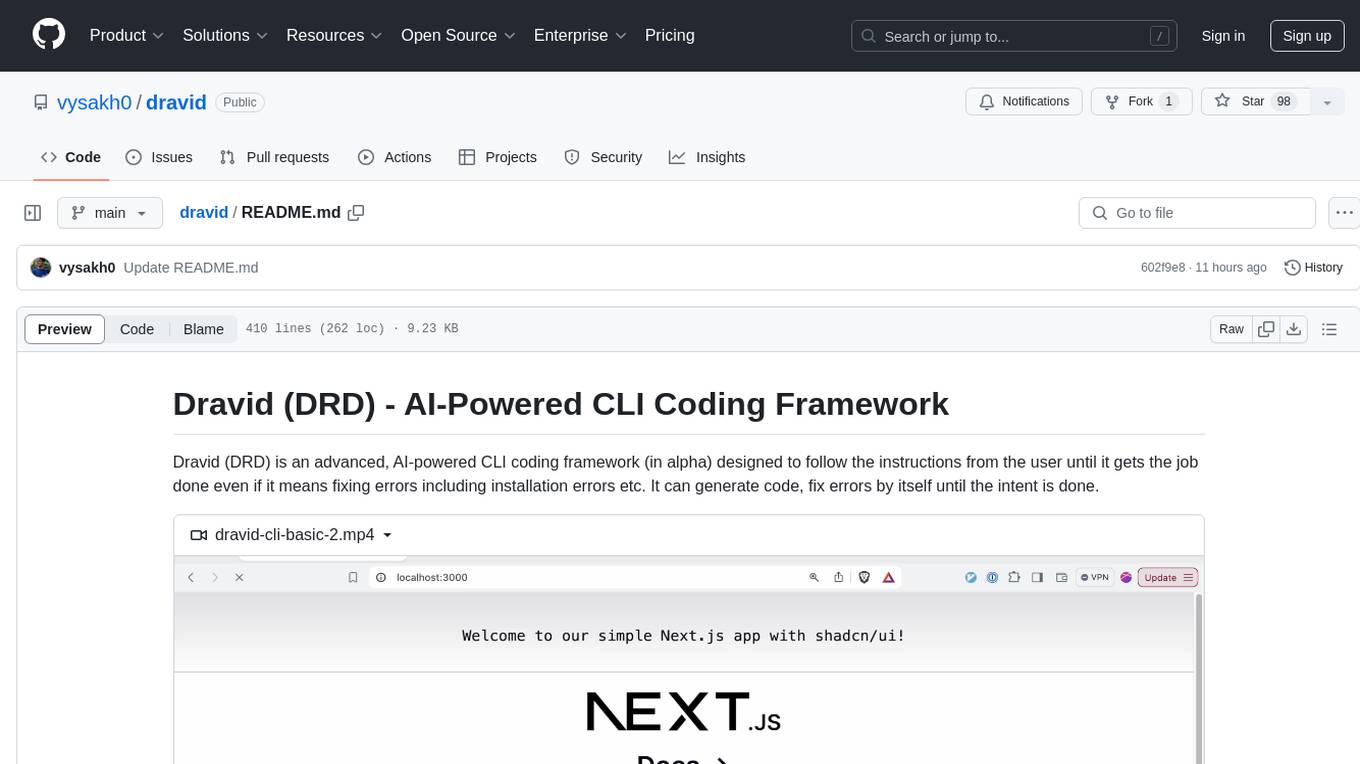
dravid
Dravid (DRD) is an advanced, AI-powered CLI coding framework designed to follow user instructions until the job is completed, including fixing errors. It can generate code, fix errors, handle image queries, manage file operations, integrate with external APIs, and provide a development server with error handling. Dravid is extensible and requires Python 3.7+ and CLAUDE_API_KEY. Users can interact with Dravid through CLI commands for various tasks like creating projects, asking questions, generating content, handling metadata, and file-specific queries. It supports use cases like Next.js project development, working with existing projects, exploring new languages, Ruby on Rails project development, and Python project development. Dravid's project structure includes directories for source code, CLI modules, API interaction, utility functions, AI prompt templates, metadata management, and tests. Contributions are welcome, and development setup involves cloning the repository, installing dependencies with Poetry, setting up environment variables, and using Dravid for project enhancements.
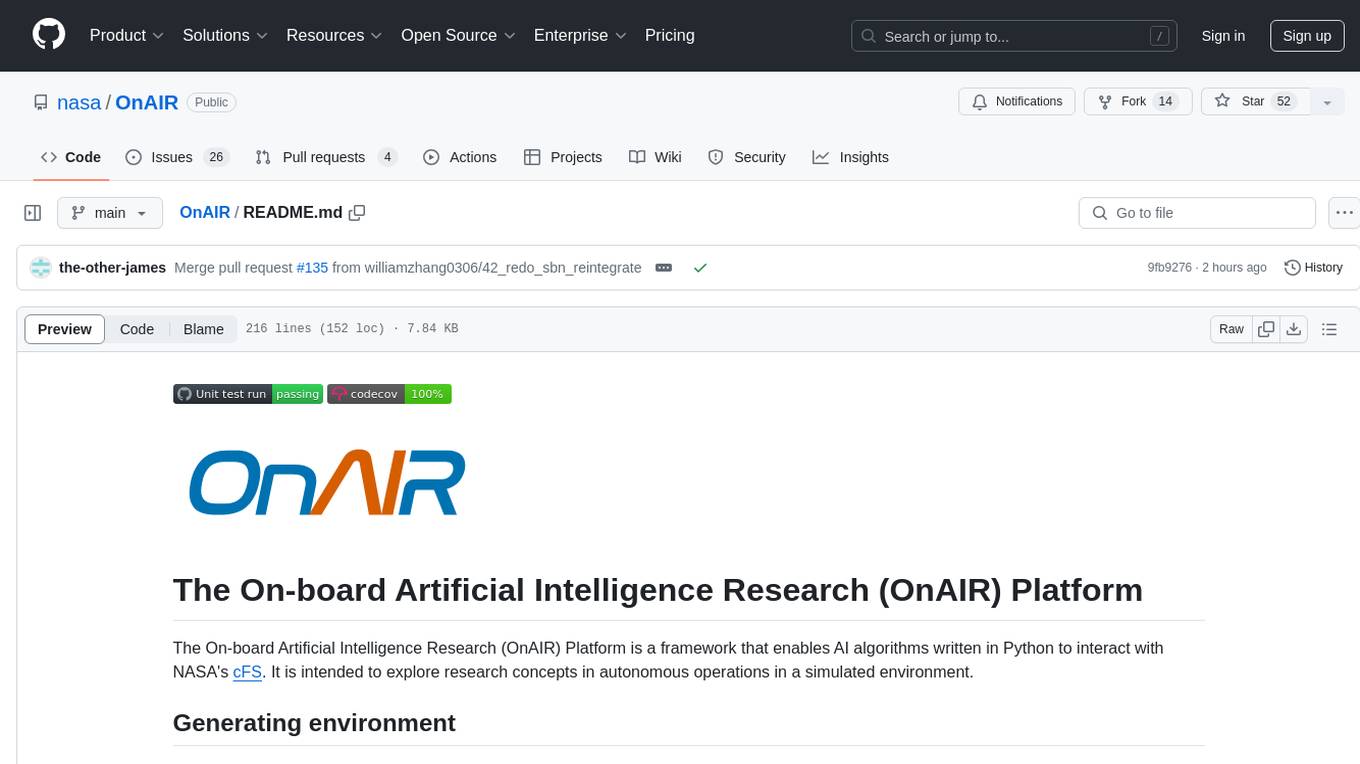
OnAIR
The On-board Artificial Intelligence Research (OnAIR) Platform is a framework that enables AI algorithms written in Python to interact with NASA's cFS. It is intended to explore research concepts in autonomous operations in a simulated environment. The platform provides tools for generating environments, handling telemetry data through Redis, running unit tests, and contributing to the repository. Users can set up a conda environment, configure telemetry and Redis examples, run simulations, and conduct unit tests to ensure the functionality of their AI algorithms. The platform also includes guidelines for licensing, copyright, and contributions to the repository.
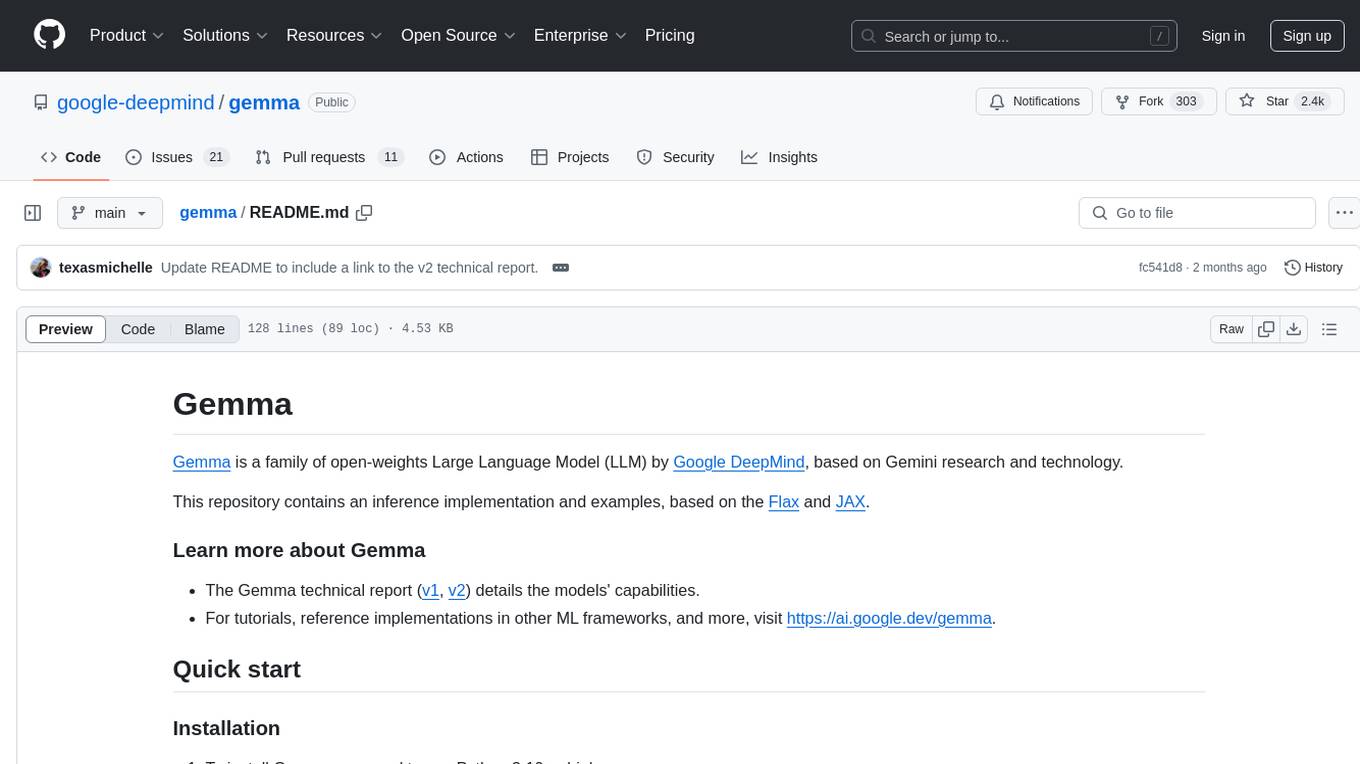
gemma
Gemma is a family of open-weights Large Language Model (LLM) by Google DeepMind, based on Gemini research and technology. This repository contains an inference implementation and examples, based on the Flax and JAX frameworks. Gemma can run on CPU, GPU, and TPU, with model checkpoints available for download. It provides tutorials, reference implementations, and Colab notebooks for tasks like sampling and fine-tuning. Users can contribute to Gemma through bug reports and pull requests. The code is licensed under the Apache License, Version 2.0.
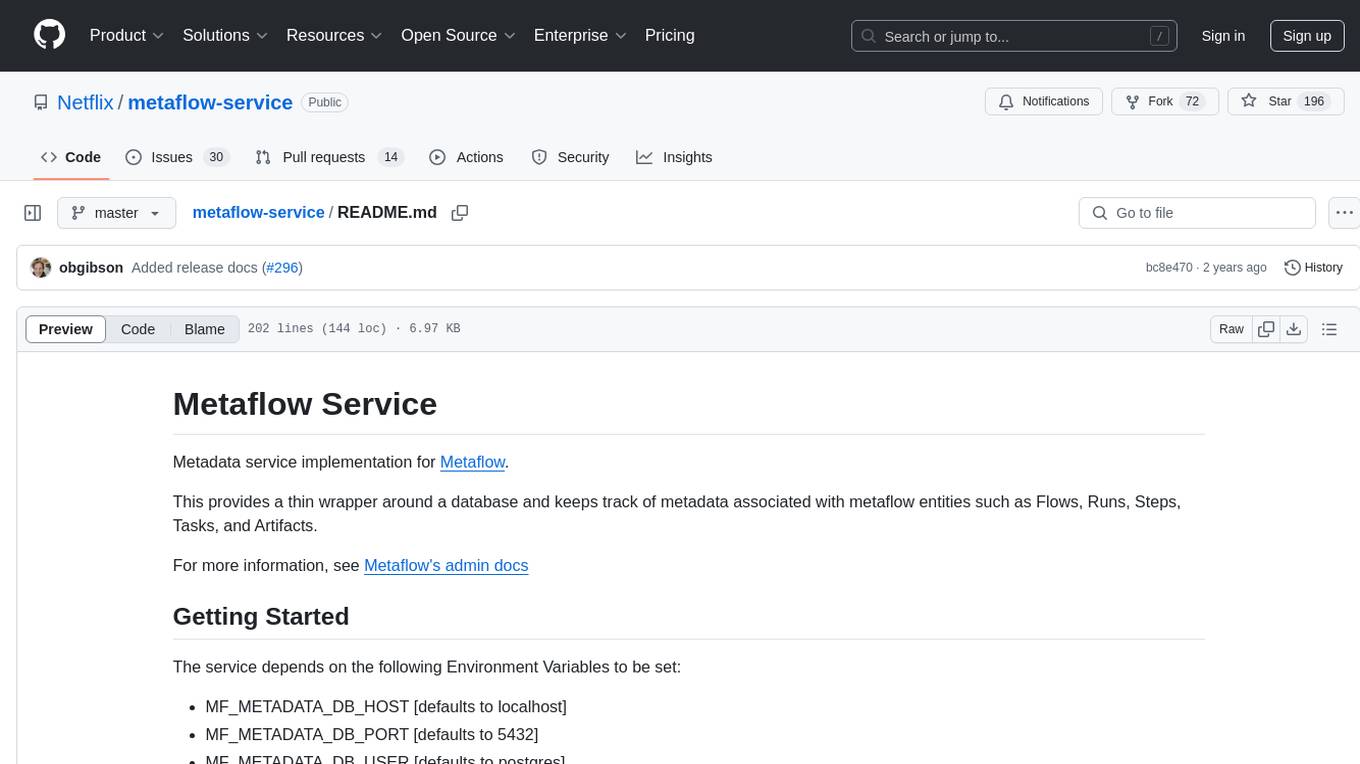
metaflow-service
Metaflow Service is a metadata service implementation for Metaflow, providing a thin wrapper around a database to keep track of metadata associated with Flows, Runs, Steps, Tasks, and Artifacts. It includes features for managing DB migrations, launching compatible versions of the metadata service, and executing flows locally. The service can be run using Docker or as a standalone service, with options for testing and running unit/integration tests. Users can interact with the service via API endpoints or utility CLI tools.
For similar jobs

firebase-ios-sdk
This repository contains the source code for all Apple platform Firebase SDKs except FirebaseAnalytics. Firebase is an app development platform with tools to help you build, grow, and monetize your app. It provides installation methods like Standard pod install, Swift Package Manager, Installing from the GitHub repo, and Experimental Carthage. Development requires Xcode 16.2 or later, and supports CocoaPods and Swift Package Manager. The repository includes instructions for adding a new Firebase Pod, managing headers and imports, code formatting, running unit tests, running sample apps, and generating coverage reports. Specific component instructions are provided for Firebase AI Logic, Firebase Auth, Firebase Database, Firebase Dynamic Links, Firebase Performance Monitoring, Firebase Storage, and Push Notifications. Firebase also offers beta support for macOS, Catalyst, and tvOS, with community support for visionOS and watchOS.
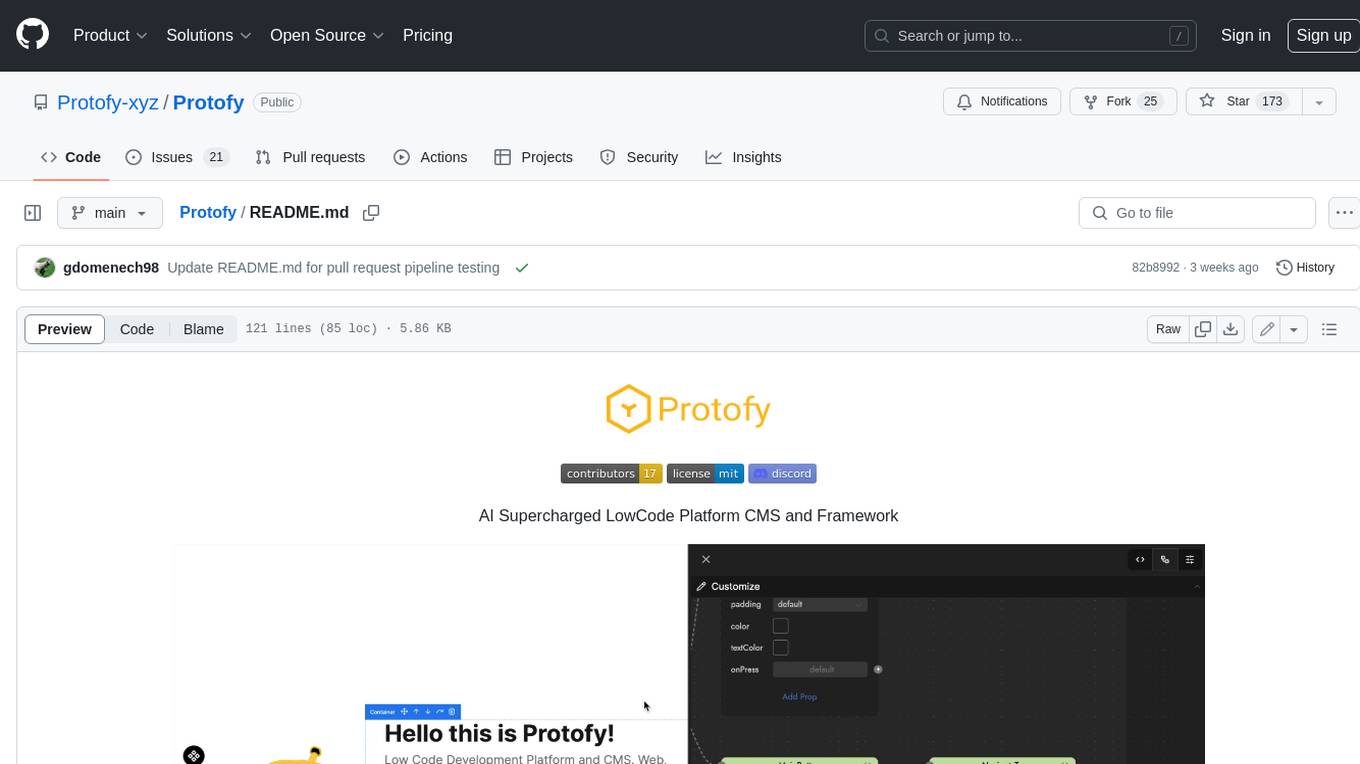
Protofy
Protofy is a full-stack, batteries-included low-code enabled web/app and IoT system with an API system and real-time messaging. It is based on Protofy (protoflow + visualui + protolib + protodevices) + Expo + Next.js + Tamagui + Solito + Express + Aedes + Redbird + Many other amazing packages. Protofy can be used to fast prototype Apps, webs, IoT systems, automations, or APIs. It is a ultra-extensible CMS with supercharged capabilities, mobile support, and IoT support (esp32 thanks to esphome).
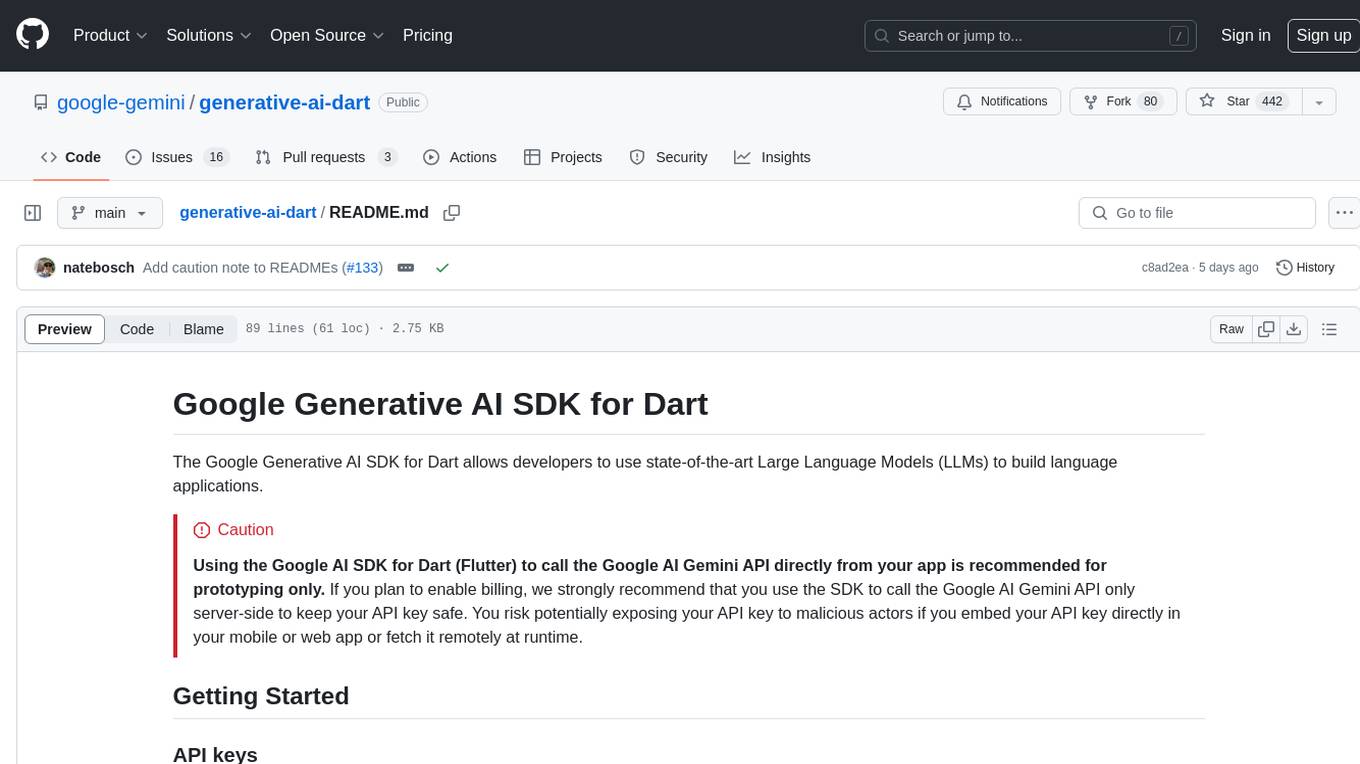
generative-ai-dart
The Google Generative AI SDK for Dart enables developers to utilize cutting-edge Large Language Models (LLMs) for creating language applications. It provides access to the Gemini API for generating content using state-of-the-art models. Developers can integrate the SDK into their Dart or Flutter applications to leverage powerful AI capabilities. It is recommended to use the SDK for server-side API calls to ensure the security of API keys and protect against potential key exposure in mobile or web apps.
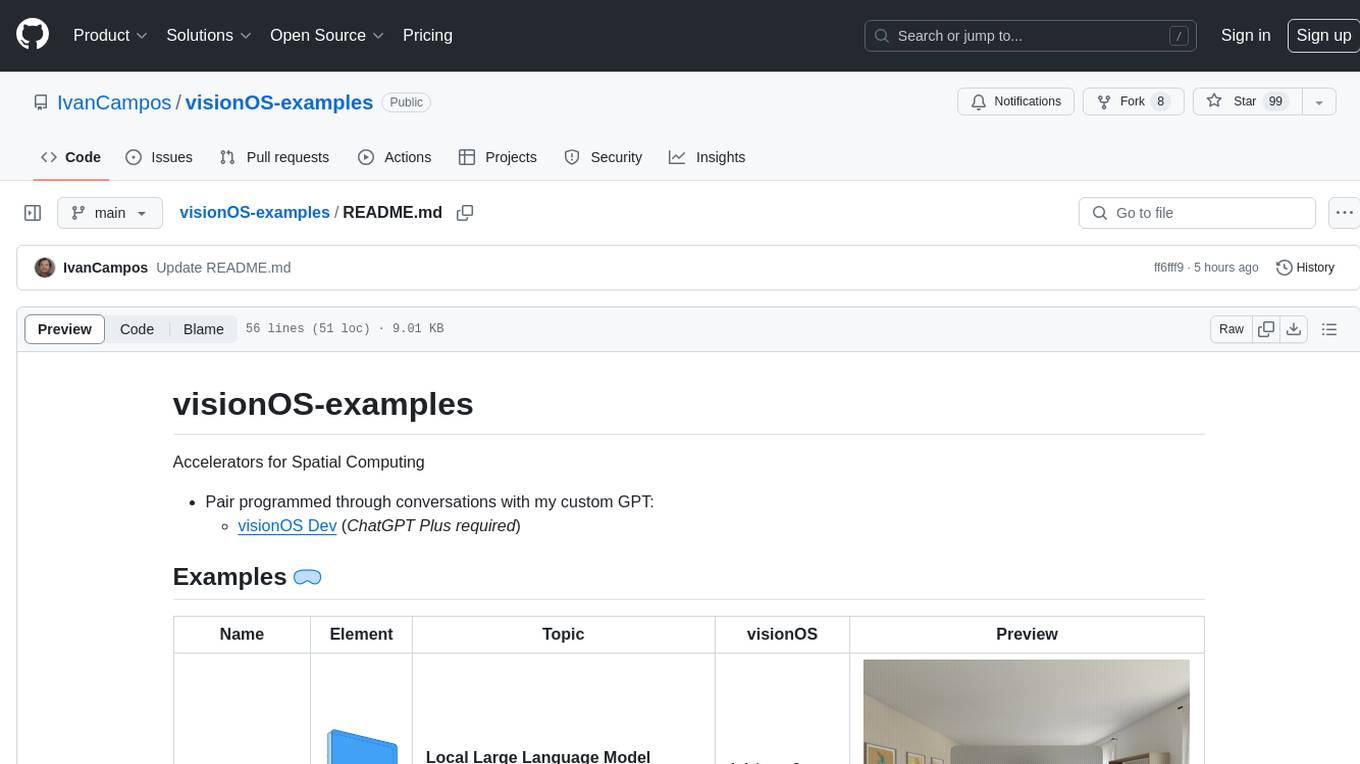
visionOS-examples
visionOS-examples is a repository containing accelerators for Spatial Computing. It includes examples such as Local Large Language Model, Chat Apple Vision Pro, WebSockets, Anchor To Head, Hand Tracking, Battery Life, Countdown, Plane Detection, Timer Vision, and PencilKit for visionOS. The repository showcases various functionalities and features for Apple Vision Pro, offering tools for developers to enhance their visionOS apps with capabilities like hand tracking, plane detection, and real-time cryptocurrency prices.
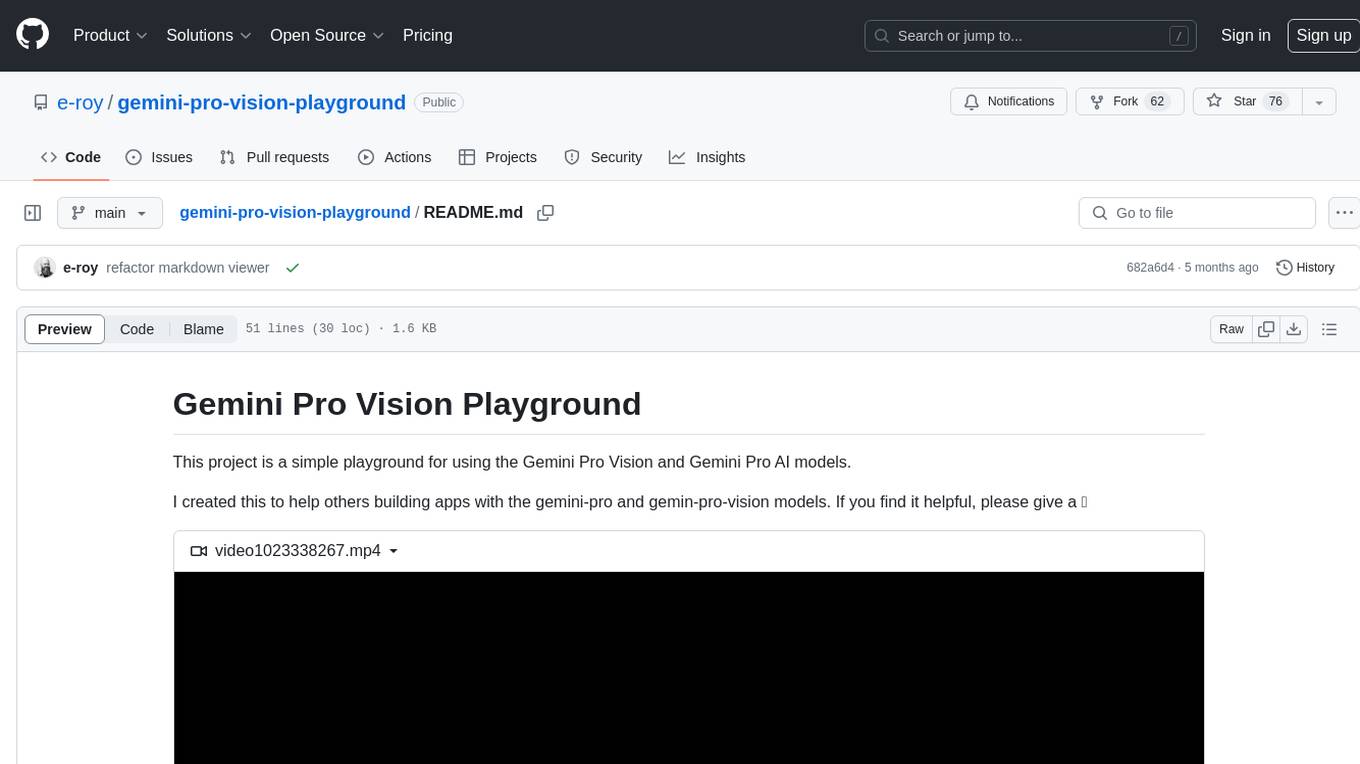
gemini-pro-vision-playground
Gemini Pro Vision Playground is a simple project aimed at assisting developers in utilizing the Gemini Pro Vision and Gemini Pro AI models for building applications. It provides a playground environment for experimenting with these models and integrating them into apps. The project includes instructions for setting up the Google AI API key and running the development server to visualize the results. Developers can learn more about the Gemini API documentation and Next.js framework through the provided resources. The project encourages contributions and feedback from the community.
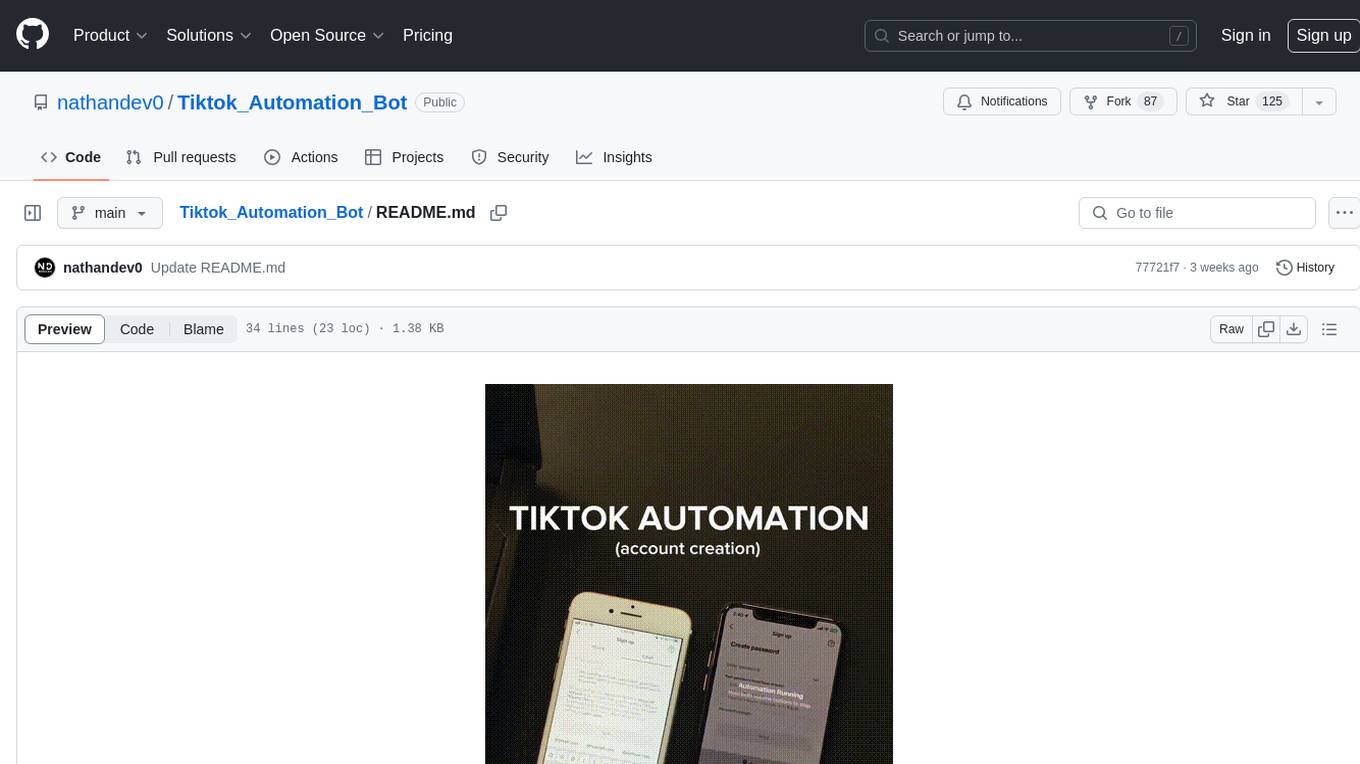
Tiktok_Automation_Bot
TikTok Automation Bot is an Appium-based tool for automating TikTok account creation and video posting on real devices. It offers functionalities such as automated account creation and video posting, along with integrations like Crane tweak, SMSActivate service, and IPQualityScore service. The tool also provides device and automation management system, anti-bot system for human behavior modeling, and IP rotation system for different IP addresses. It is designed to simplify the process of managing TikTok accounts and posting videos efficiently.

general
General is a DART & Flutter library created by AZKADEV to speed up development on various platforms and CLI easily. It allows access to features such as camera, fingerprint, SMS, and MMS. The library is designed for Dart language and provides functionalities for app background, text to speech, speech to text, and more.
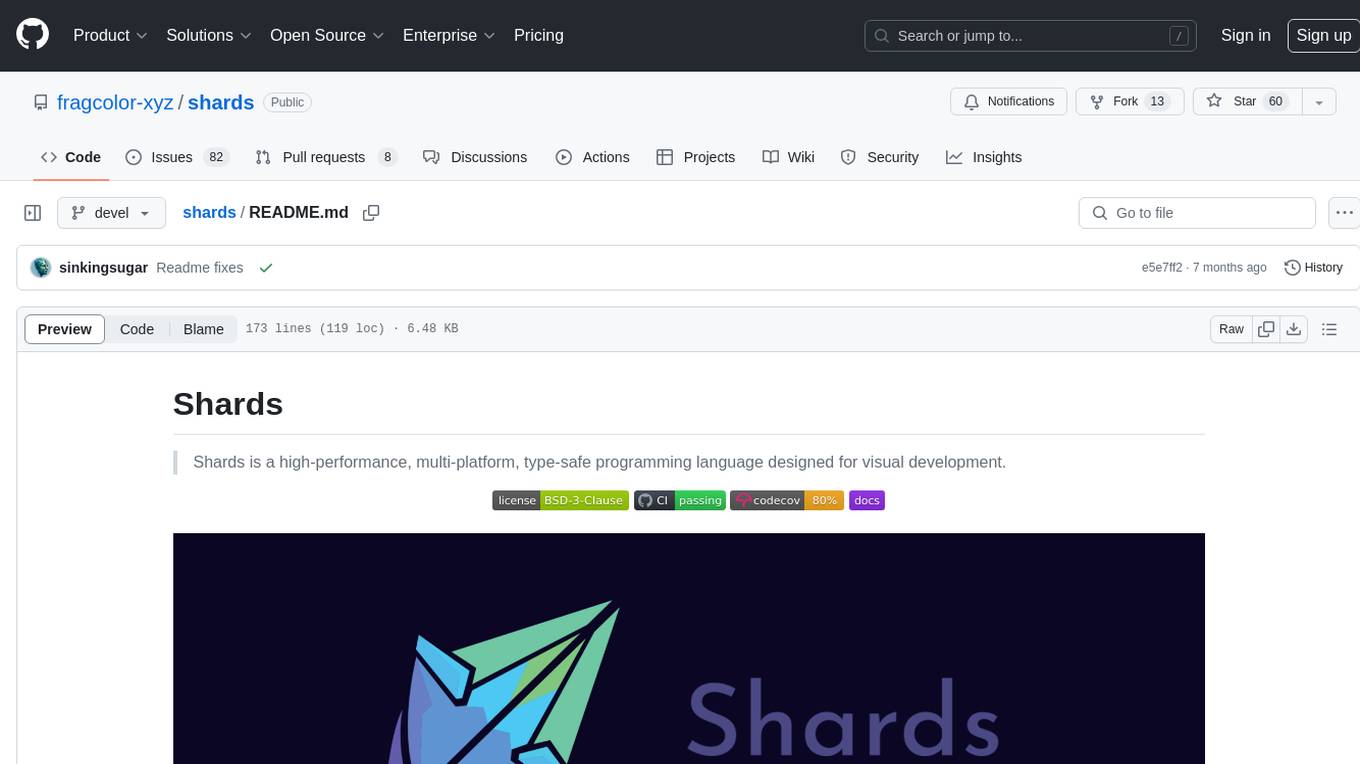
shards
Shards is a high-performance, multi-platform, type-safe programming language designed for visual development. It is a dataflow visual programming language that enables building full-fledged apps and games without traditional coding. Shards features automatic type checking, optimized shard implementations for high performance, and an intuitive visual workflow for beginners. The language allows seamless round-trip engineering between code and visual models, empowering users to create multi-platform apps easily. Shards also powers an upcoming AI-powered game creation system, enabling real-time collaboration and game development in a low to no-code environment.




